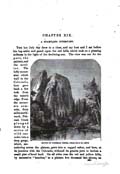
[p. 301]
CHAPTER XIX.
A STARTLING INTERVIEW.
The hot July day drew to a close, and my host and I sat before his log-cabin and gazed upon the red hills, which took on a pleasing softness in the light of the declining sun. The view was one for the poet, the
MOUTH OF PAHREAH CREEK, NEAR JOHN D. LEE'S
painter, and the novelist. The lofty mountains which wall in the Colorado, here gave back a few rods from the water's edge. From the mountain summite forty miles northward, Pahreah Creek plunged down by a series of wild casades into a deep gorge, which, meandering across the plateau, grew into a rugged cafion, and here, at its junction with the Colorado, widened its granite jaws to inclose a small plat of level land. On all sides rose the red and yellow bills, by successive "benches," to a plateau five thousand feet above; on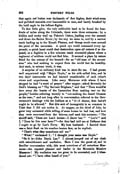
[p. 302]
that again red buttes rose thousands of feet higher, their wind-worn and polished summits ever inaccessible to man, and barely brushed by the bald eagle in his loftiest flights.
To this little glen, the only cultivable land to be foumd for hundreds of miles along the Colorado, there were three entrances: by a hidden and rocky trail up Pahreah Canon, leading over the summit and down the Sevier River; by the way we came in, and by a narrow track leading up to the Kanab Plateau, and thenge south-west around the point of the mountain. A quick eye could command every approach; a quick hand could deal destruction upon all comers if so disposed, or a fugitivein a few. minutes reach concealed places where a regiment of soldiers could not find him. It seemed a place by nature fitted for the retreat of the huuted—for an "old man of the mountains" who had nothing to expect from the world butits hostility. And such, in solemn truth, it was.
A surprise of no ordinary kind was in store for me. I had grown well acquainted with "Major Doyle," as his wife called him, and in two days' intercourse we had learned considerable of each other's views and experiences. Like many Mormons with whom I have stopped he had "a word of prayer" after supper; asked fervently for God's blessing on "Thy Servant Brigham," and that "Thou would'st turn away the hearts of the Lamanites from making war on thy I people," besides referring warmly to "our making the desert blossom as the rose;" and not long after in conversation referred to the Government's dealings with the Indians as a "d—d shame, that hadn't ought to be allowed." But this sort of incongruity is so common in Utah that I did not notice it. At supper, on the third of July, he grew very animated while telling of some horses he had lost, and how they were recovered from the thieves; and used this sentence: "The sherif said, 'These are Lee's horses—I know 'em.'" "Lee's!" said I, "Does he live near here?"—for they had told me at Defiance that I ought to go by Lee's Ferry. My host hesitated. I fancied there was a faint Hush on his weather-beaten face, as he replied:
"That's what they sometimes call me."
"What!" exclaimed I; "I thought your name was Doyle."
"So it is—John Doyle Lee." I almost jumped out of my chair with astonishment and confusion. Here I was the guest of, and in Guniliar conversation with, this most notorious of all notorious Mormons—the reputed planner and leader in the Mountain Meadow Massacre! My confusion was too great to be concealed, and I blundered out: "I have often heard of you."

[p. 303]
"And heard nothing that was good, I reckon." This, with some bitterness of tone. He then continued, speaking rapidly:
"Yes, I told my wives to call me Doyle to strangers; they've been kicking up such a muse about polygamy, McKean and them, and I'm a man that's had eighteen wives; but now that the Supreme Court has decided that polygamy's part of a man's religion, and the law's got nothin' to do with it; it do n't make no diference, I reckon."
Of course this was only a subterfuge, but I could not have ventured to recur to the real reason of his being located in this wild place, if he had not approached the subject himself soon after. Then I hinted as delicately as possible, that if it were not disagreeable to him, I should like to hear "the true account of that affair which had been the cause of his name being so prominent." It had grown dark meanwhile, and this gave him, I thought, more freedom in his talk. (It is to be noted that he did not know my name or business.) Clearing his throat nervously, he began, with many short stops and repetitions:
"Well, I suppose you mean that—well, that Mountain Meadow affair? Well, I'll tell you what is the exact truth of it, as God is my Judge, and the why I am out here like an outlaw—but I'm a goin' to die like a man, and not be choked like a dog—and why my name's published all over as the vilest man in Utah, on account of what others did—but I never will betray my brethren, no, never—which it is told for a sworn fact that I violated two girls as they were kneeling and begging to me for life; but, as God is my Judge, and I expect to stand before Him, it is all an infernal lie."
He ran of this and much more of the sort with great volubility; then seemed to grow more calm, and went on:
"Now, sir, I'll give you the account exactly as it stood, though for years I've rested under the most infamous charges ever cooked up on a man. I've had to move from point to point, and lost my property, when I might have cleaned it up any time by just saying who was who. I could have proved that I was not in it, but not without bringing in other men to criminate them. But I wouldn't do it. They had trusted in me, and their motives were good at the start, had as the thing turned out.
"But about the emigrants. They was the worst set that ever crossed the plains, and they made it so as to get here just when we was at war. Old Buchanan had sent his army to destroy us, and we had made up our minds that they should not find any spoil. We had been making preparations for two years, drying wheat and caching it in the mountains; and intended, when worst come to worst, to burn and
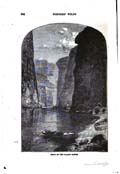
[p. 304]
WESTERN WILDS.
HEAD OF THE GRAND CAÑON.
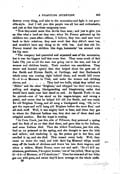
[p. 305]
destroy every thing, and take to the mountains and light it but guerrilla style. And I tell you this people was all hot and enthusiastic, and just at that time these emigrants came.
"Now they acted more like devils than men; and just to give you an idea what a hard set they was: when Dr. Forney gathered up the children two years alter—fifteen, I believe, they was—and sent word back to their relatives, they sent word that they did n't want 'em, and would n't have any thing to do with 'em. And that old Dr. Forney treated the children like dogs, hammerin' 'em around with his big cane.
"The company had quarreled and separated east of the mountains, but it was the biggest half that come first. They come south of Salt Lake City just as all the men was going out to the war, and lots of women and children lonely. Their conduct was scandalous. They swore and boasted openly that they helped shoot the guts out off Joe Smith and Hyrum Smith, at Carthage, and that Buchanan's whole army was coming right hehind them, and would kill every G—d d—n Mormon in Utah, and make the women and children slaves, and . . . . . They had two bulls, which they called one 'Heber' and the other 'Brigham,' and whipped 'em thro' every town, yelling and singing, blackguarding and blaspheming oaths that would have made your hair stand on end. At Spanish Fork—it can be proved—one of 'em stood on his wagon-tongue, and swung a pistol, and swore that he helped kill old Joe Smith, and was ready for old Brigham Young, and all sung a blackguard song, 'Oh, we've got the ropes and we'll hang old Brigham before the snow flies,' and all such stuff. Well, It was mighty hard to bear, and when they got to where the Pahvant Indians was, they shot one of them dead and crippled another. But the worst is coming.
"At Corn Creek, just this side of Fillmore, they poisoned a spring and the flesh of an ox that died there, and gave that to the Indians, and some Indians died. Then the widow Tomlinson, just this side, had an ox poisoned at the spring, and she thought to save the hide and tallow; and rendering it up, the poison got in her face, and swelled it up, and she died. This roused every body. Well, they came on down the road, and with their big Missouri whips would snap of the heads of chickens and throw 'em into their wagons; and when a widow, Missis Evans, came out and said: 'Don't kill my chickens, gentlemen, I'm a poor woman,' one of 'em yelled, 'Shut up you G—d d—d Mormon, or I'll shoot you !' Then her sons and all her folks got out with guns, and swore they'd have revenge on the whole outfit.
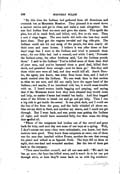
[p. 306]
"By this time the Indians had gathered from all directions, and overtook 'em at Mountain Meadow. They planned it to crawl down a narrow ravine and get in close, and make a rush altogether. But one fool Indian fired too soon and gave the alarm. This spoilt the plan, but all in reach tired, and killed, well, five or six men. Then a sort o' siege began. The men inside did well—the best they could have done. They got the wagons corraled and dug rifle-pits. The Indians could not hit any more of the people, but shot nearly all their oxen and some horses. I believe it was after three or four days' siege that I went to the Indians and tried to persuade them away; for our folks had had a council, and while I said, 'Persuade the Indians away, the other brethren said, 'Let the Indians punish them.' I said to the Indians 'You've killed more of them than died of your men, and you've harassed them a good deal, killed their stock, and punished them enough—now let them go.' But they said these white men were all bad, and they would kill all. Jacob Hamlin, the agent, you know, was away from home then, and I had n't much control over the Indians. We was weak then in that section to what we are now, and did not really have the upper hand of the Indians; and maybe, if we interfered with 'em, it would cause trouble with us. I heard women inside begging and praying, and saying that if the Mormons knew how they were situated they would come and help, no matter if some had treated 'em badly. And they begged some of the fellows to break out and go and get help. Then I run a big risk to get inside the corral. It was pitch dark, and I could see the line of fire from the guns, and the balls whistled all about me. One cut my shirt in front, and another my sleeve, and I could not get through. But I went back, and was pretty near getting the Indians all right, and would have succeeded fully, but then come the thing that spoiled all.
"Three of the emigrants had broken out of the corral and gone back for help; and next day met some of our boys at a spring. Well, I do n't excuse our men—they were enthusiastic, you know, but their motives were good. They knew these emigrants at once; one of them was the man that insulted widow Evans, another the one that swung his pistol and talked so at Spanish Fork. The boys fell on them at sight, shot one dead and wounded another. But the two of them got back to the company.
"Then came another council, and all our men said: 'We can't let 'em go now; the boys has killed some, and it won't do to let one get through alive, or here they'll come back on us with big reinforce-
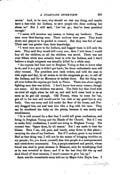
[p. 307]
ments! And, to be sure, why should we risk any thing, and maybe have a fuss with the Indians, to save people who done nothing but abuse us? But I still said, 'Let 'em go; they've been punished enough.'
"I never will mention any names, or betray my brethren. Those men were God-fearing men. Their motives were pure. They knelt down and prayed to be guided in council. But they was full of zeal. Their zeal was greater than their knowledge.
"I went once more to the Indians, and begged them to kill only the men. They said they would kill every one; then I told them I would buy all the children, so all the children was saved. There was not over fifteen white men actually went in with the Indians, and I don't believe a single emigrant was actually killed by a white man.
"An express had been sent to Brigham Young at first to know what to do, and it is a pity it didn't get back; for those enthusiastic men will obey counsel. The president sent back orders, and told the man to ride night and day, by all means to let the emigrants go on; to call off the Indians, and for no Mormons to molest them. But the thing was all over before the express got back to Provo. There was about eighty fighting men that was killed. I don't know how many women, though not many. All the children was saved. The little boy that lived with us cried all night when he left us, and said he'd come back to us as soon as he got old enough. Old Forney, when he come for 'em, got all in his tent and would not let 'em visit or say good-bye to any body. One run away and hid under the floor of the house, and Forney dragged him out and beat him like a dog with his cane. They say he murdered the baby on the plains, because it was sickly and troublesome.
"It is told around for a fact that I could tell great confessions, and bring in Brigham Young and the Heads of the Church. But if I was to make forty confessions, I could not bring in Brigham Young. His counsel was: 'Spare them, by all means.' But I am made to bear the blame. Here I am, old, poor, and lonely, away down in this place—carrying the sins of my brethren. But if I endure, great is my reward. Bad as that thing was, I will not be the means of bringing troubles on my people; for, you know yourself, that this people is a misrepresented and cried-down community. Yes, a people scattered and peeled, whose blood was shed in great streams in Missouri, only for worshiping God as he was revealed to them; and if at the last they did rise up and shed blood of their enemies, I won't consent to give 'em up."
Such was the remarkable story told me by Major John Doyle Lee. I
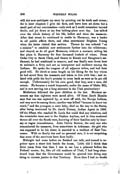
[p. 308]
will not now anticipate my story by pointing out its truth and errors; for in later chapters I give the facts, and have here set down but a small part of our conversation—only such as I could remember beyond doubt, and jot down at my first halting-place next day. Lee talked over the whole history of his life, before and since the massacre. After that event he continued to reside in Harmony, was a leader in all public affairs there, and often entertained Brigham Young when the latter visited that section. Thence he was ordered "on a mission" to establish new settlements further into the wilderness; and obeyed, as do all good Mormons, without a murmur, selling his fine place in Harmony for four thousand bushels of wheat. From Cedar City to Santa Clara, and thence to Kanab and Mangrum's settlement, he had continued to remove, and was finally sent down here to maintain a ferry and act as interpreter and mediator among the Indians. He spoke the tongues of all adjacent tribes, and had their good will. He dwelt at some length on his liking for the boy whom he had saved from the massacre and taken to live with him; and related with pride the boy's promise to come back as soon as he got old enough. Unfortunately for his own good, that boy, now a man, did return. He became a noted desperado, under the name of Idaho Bill, and is now serving out a long sentence in the Utah penitentiary!
Misfortune followed the poor children to the last. Mormon accounts say that eighteen were saved alive. Of these Jacob Hamlin says that one was captured by, or went of with, the Navajo Indians, and may now be among them; another was killed "because he knew too much," and the youngest, a mere baby, died on the way to the States, after being recovered by Dr. Jacob Forney, Indian Agent in 1859. Of the fifteen who reached St. Louis few could find any relatives, and the remainder were sent to the Orphan Asylum, and in time scattered thence all over the South-west, knowing of their families only by hearsay or vague remembrance. John Calvin Sorrow, the only one who remembered the massacre, lives somewhere in Arkansas; the girl who was supposed to be his sister, is married to a resident of East Tennessee. With no family ties and no parental care, it is not surprising that some of the survivors have done badly.
Midnight had come before we finished our talk, and turned in together upon a straw tick beside the house. Little did I think that three years from that time I was to see Lee a prisoner before the Federal courts; for, like all old residents of Utah, I had long abandoned hope that the Government could be spurred into doing anything to execute justice in that Territory. Even then I had no doubt
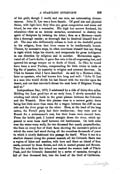
[p. 309]
of his guilt, though I could, and can now, see extenuating circumstances; John D. Lee was a born fanatic. Of good size and physical frame, with light hair, fiery blue eye, gross composition and warm red blood, he was also a sensualist. His high but narrow forehead, his education—first as an intense sectarian, accustomed to destroy the spirit of Scripture by twisting the letter; then as a Mormon—made him a thorough casuist; so thorough that he deceived himself first of all. The man who deliberately refuses to look at the doubtful points in his religion, from that hour ceases to be intellectually honest. Thence, by successive steps, he often convinces himself that any thing is right which helps his church, and compounds for gross indulgence in one direction by religious zeal in another. Mormonism aggravated all of Lee's faults; it gave free rein to his all-engrossing lust, and spurred his savage temper on to deeds of blood. In Ohio he would have been a sour Puritan, compounding for little tricks in trade or big fits of passion, by austerity in religion and extreme decorum. In Utah he became what I have described. As said by a Mormon elder, later an apostate, who had known him long and well: "John D. Lee is a man who would divide his last biscuit with the traveler upon the desert, and cut that traveler's throat the next hour if Brigham Young said so."
Independence Day, 1872, I celebrated by a ride of thirty-five miles. Bidding the Lees good-bye at an early hour, I slowly ascended the winding trail which leads to the great plateau between the Colorado and the Wasatch. Here this plateau runs to a narrow point, there being but little more than room for a wagon between the cliff on one side and the river gorge on the other. Here, at the head of the long cation, the Powell party had their rendezvous; they were now in Kanab for a midsummer's rest, but their boats were moored here. From the bridle path I looked straight down the river, which appeared to soon loose itself between red battlements. On both sides rose the water-worn walls, for two thousand feet nearly perpendicular, the lines on every foot of their faces showing the successive points at which the water had stood during all the countless thousands of years in which it slowly fashioned this passage for itself. When it ran in a shallow channel along the present summit, all the Colorado Basin was a region of lakes and marshes, with here and there an island of firm earth, covered by dense forests, and rich in matted grasses and flowers. Then the mist from this inland sea washed the western base of Pike's Peak, and the Colorado descended by a series of cascades, through a fall of four thousand feet, into the head of the Gulf of California.
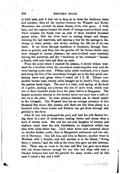
[p. 310]
A little later, and it had cut so deep as to drain the shallower lakes and marshes; then all the interior between the Wasatch and Rocky Mountains was covered by dense forests, lively with game. A little later, and the regions became the abode of strange semi-civilized races. Their remains are found over an area of three hundred thousand square miles. Still the river went on cutting deeper and deeper, draining the last reservoirs, and opening a way for the springs to discharge at lower points; and slowly sucking the life out of its own basin. It cut down through sandstone to limestone, through limestone to granite, and deep into the granite, till the former fertile vales were changed to barren plateans; the semi-civilized races vanished, leaving few survivors, and the "backbone of the continent "became a desert, with only here and there an oasis.
From the point where I reached the plateau, it slowly widens westward for a hundred miles, the mountains continuing due west, and the river bearing south-west. Fifteen miles south-westward, over a desert and along the foot of the mountains, brought me to the first gulch containing water and grass, where I re ted till 2 P. M. Thence over another barren mesa, twenty miles brought me to Jacob's Pool, where the pasture lands begin. The pool is a clear, cold spring, at the head of a gulch, sending out a stream the size of one's wrist, which runs two or three hundred yards down the plain before it disappears. The largest mountain streams in this section never run more than a mile or two on to the plain. In some places a channel can be traced nearly to the Colorado. The Wasatch here has an average elevation of iive thousand feet above this plateau, and there are but three places in a hundred miles where horses and footmen can get down through side gulches to the river.
John D. Lee had preëmpted the pool, and had his wife Rachel living there in a sort of brush-tent, making butter and cheese from a herd of twenty cows. She and her son and daughter of sixteen and eighteen years were the sole inhabitants, no neighbors within less than forty miles either way. Lee's other wives were scattered about on ranches farther north; four at Mangrum's settlement and two others at Harmony. One left him, and lives at Beaver; another went to Montana with a Gentile, and still another is in the States, "living fancy, I reckon,” said the wife at the river, who gave me this information. There was no room in the tent, and Mrs. Lee gave me a straw tick out doors—luxury enough for one who had slept with only a blanket between him and the ground for many weeks; and at this oasis I rested a day and a half.
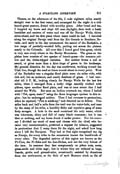
[p. 311]
Thence, on the afternoon of the 6th, I rode eighteen miles nearly straight west to the first water, and encamped for the night in a rich bunch-grass pasture, dotted with scrubby pines. After bread and tea, I hoppled my horse and slept till neardaylight, then took a hasty breakfast and canteen of water and was off for Navajo Wells, thirty miles ahead, and the first place where water could be had. I traveled along the original Navajo trail from the Rio Grande to Southern Nevada; and early in the day commenced the ascent of the Buckskin, a low range of partially-wooded hills, putting out across the plateau nearly to the Colorado. All over this I found good blue-grass, which is very rare every-where in the Rocky Mountains. The grass on the plains here consists of two species of bunch-grass—the common yellow and the white-topped varieties. But neither forms a sod or award, or gives more than a faint tinge of green to the landscape. A My general direction for the day was north-west, working toward the Utah line, though the road at times wound about to every point. West of the Buckskin was a singular flood plain some six miles wide, with rich soil, but no moisture, and nearly destitute of grass. I had traveled till 3 P. M., looking closely for Navajo Wells for the last few miles, when I emerged from a rocky ridge scantily clothed with piñons, upon another flood plain, and was at once aware that I had missed the Wells. But soon an Indian overtook me, whom I hailed with "Toh, agua, water!" using the three languages spoken in this region; but he understood neither. Then I had recourse to pantomime, when he rejoined, "Pah to wicki-up," and directed me to follow. Two miles back and half a mile from the trail was the water-hole, and near by the camp of his tribe, a horribly filthy and repulsive gang of some forty savages. A hole in the sand contained the only water, which was lukewarm, slimy and full of nasty black creatures; but it was that or nothing, and my horse drank it under protest. For his courtesy I divided my stock of meat and cheese with the chief, who became very communicative, preferred a request for tobacco, suggested in pantomime that I camp there fdr the night, and asked how long I since I lett the Navajoes. They had at first sight recognized my rig as Navajo, for every tribe in the mountains knows the handiwork of every other. The degraded natives of this region are known as the Pi-Utes, the Pi-Edes and the Lee-Biches, and are the very lowest of the race. In summer they fare sumptuously on pinon nuts, roots, grass-seeds and white sage; but in winter they are reduced to bugs, lizards, grabs and ground-mice, occasionally assisted by donations from the settlements, or the flesh of such Mormon stock as die of
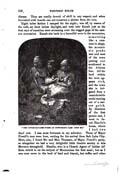
[p. 312]
disease. They are totally devoid of skill in any respect, and when furnished with boards can not construct a shelter from the rain.
Eight miles farther I camped for the night; was off, by reason of the cold, an hour before daylight, and rock; into Kanab just as the first rays of sunshine were streaming over the rugged gaps of the eastern mountains. Kanab sits back in a beautiful cove in the mountains, something
THE LITTLE SAVAGES FIXED AN UNWINKING GAZE UPON ME.
like a crescent in shape, the mountain peaks east and west of the town putting out southward to the Arizona line. All the land within the cove appears rich, and the town site is irrigated from a considerable creek running out of a narrow gulch. By direction of the first person met, I went to Jacob Hamlin's house, where I had two days' rest. I was most fortunate in my selection. Three of Major Powell's men were here, waiting for his arrival from Salt Lake City. Here, also, I found Mr. and Mrs. Thomson, of Major Powell's party, so altogether we had a very delightful little Gentile society in this Mormon stronghold. Hamlin, who is a Church Agent of Indian Affairs, struck in on the subject of Mormonism the first meal; but as I was once more in the land of beef and biscuit, hot cofee and other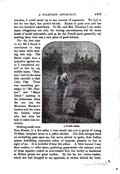
[p. 313]
luxuries, I could stand up to any amount of argument. We had it hot for two days, but parted friends. Kanab is quite new, and has but two hundred inhabitants. To Mr. and Mrs. Thomson I am under many obligations, not only for writing conveniences, but for many hours of social enjoyment; and as for the Powell party generally, my meeting them here was a rare piece of good fortune.
For the first time
A PI-EDE CERES.
in my life I found it convenient to drop my name while making this trip. The Saints might have a prejudice against me, so I introduced my middle name, "Hanson,"and by the same title traveled to Salt Lake City. There was something grotesque in "Mr. Hanson" and "Major Doyle" meeting in the wilderness, when the one was the Mountain Meadow's butcher and the other the Gentile writer who had done his best to make him notorious.Striking south-west from Kanab, in a few miles I very nearly ran over a group of young Pi-Edes, crouched down in a pinon thicket. The little savages fixed an unwinking gaze upon me, but never stirred or spoke, their Indian nature forbidding expression either of surprise, pleasure or fear at sight of me. It is doubtful if they felt either. A little beyond I saw their mother, or older sister, gathering grass-seeds—the summer work of these squaws—naked as new-created Eve, but hardly so handsome as Milton paints our great mother. By her lay her wicker-basket, which she had dropped at my approach, to retreat behind the bush,
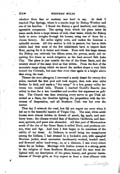
[p. 314]
whether from fear or modesty was hard to say. At dark I reached Pipe Springs, where is a ranche kept by Bishop Windsor and one of his families. I found the Bishop a good landlord, and chatty, agreeable companion. The spring from which the place hikes its name sends down a large stream of cold, clear water, which the Bishop leads in stone troughs through his houses, using one of them for a cheese factory. He milks eighty cows, and makes the business a splendid success. All this section is rich in pasture, but has so little arable land that most of the few inhabitants have to import their flour, paying for it in butter and cheese. Even with this large stream the Bishop can cultivate but fifteen acres, the porous, sandy soil requiring five times as much irrigation as the land around Salt Lake City. The place is just outside the rim of the Great Basin, and the country about of the same level as that within. From the foot of the mountain range along which we travel the surface slopes a very little toward the Colorado, but near that river rises again to a height above that along the road.
Thence the next afternoon I traversed a sandy desert for twenty-five miles, reached the first pool and took supper, then rode nine miles further by dark, and made a "dry camp" in a low, grassy valley between two wooded hills. Thence I reached Gould's Ranche (ten miles) in time for a late breakfastand another hot argument on politics. The Church was then straining every nerve to get Utah admitted as a State, the Gentiles fighting the proposition with the bitterness of desperation, and all Southern Utah was hot over the matter.
That day I mistook the road, but did not regret my error when it led me to the beautiful hamlet of Virgin City. The neat, white adobe houses were almost hidden in forests of peach, fig, apple, and mulberry trees; the climate rivaled that of Southern California, and damsons, apricots, and pears also abounded. All that part of Mormondom south of the rim of the Great Basin is called Dixie, and produces cotton, wine and figs. And here I first began to be conscious of the oddity of my dress. At Defiance, to avoid being too conspicuous among the Indians, I had dressed in a buckskin suit, with spangled Mexican jacket, stout moccasins handsomely worked, beaded scarf and flowered calico head-wrap; so, at a distance, I was every-where taken for an Indian. Marriage with Indian women is a strong point in the religion of these Southern Mormons, and the men were delighted with my description of the grace, beauty, and general desirableness of Navajo girls, as they expect to form a close alliance with
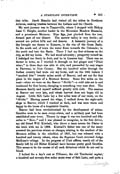
[p. 315]
that tribe. Jacob Hamlin had visited all the tribes in Northern Arizona, making treaties between the Indians and the Church.
My next journey was to Toquerville, where I stopped with Bishop Isaac C. Haight, another leader in the Mountain Meadow Massacre, and a prominent Mormon. Ripe figs, just plucked from the tree, formed part of our dessert. The narrow valley is very fertile; all around are yellow hills and red deserts. A leisurely journey of a day brought me thence to Kanarra, in the rim of the Great Basin. In the south end of town the water flows towards the Colorado; in the north end into the Basin. There I had my first sickness on the trip, as did my horse. We had stood adversity; prosperity mined us. I indulged too freely in fruit, and he in Lucerne hay. There was no doctor in town, so I worried it through on hot ginger and "Dixie wine;" in three days was able to ride, and proceeded by easy stages to Parowan, in Iron County. But six hundred miles through the Indian country had worn out my horse, and on the 16th instant I "ranched him" twenty miles south of Beaver, and set out for that place in the wagon of a Mormon farmer. Some live miles on the road—when we were on the Beaver "divide"—a cold rain set in and continued for four hours, changing to something very near sleet. The Mormon family and myself suffered greatly with cold. The seasons at Beaver are very late, and wheat harvest does not begin till in I August. Little Salt Lake lay a few miles west of our route, on the "divide." Having passed the ridge, I walked down the eight-mile slope to Beaver, which I reached at dark, and was soon warm and happy in the house of a hospitable Gentile.
Beaver had been revolutionized by the development of mines. Gentiles were to be seen every-where, and a military post had been established near town. Thence by stage it was two hundred and fifty miles to "Zion;" and I was pleased to recognize, in the first driver, my old friend Will Kimball, who drove a team across the Plains in the train with me in 1868. Kimball's father was one of the many arrested the previous winter on charges, relating to the conduct of the Mormon militia in the rebellion of 1857, but was released with a hundred and twenty others, when the Supreme Court reversed Judge McKean's rulings. In the progress of Utah affairs, nearly all of the family left by old Heber Kimball have become pretty good Gentiles. This seems to be the course of all such delusions which do not end in blood.
I halted for a day's rest at Fillmore, the old Territorial capital, a hundred and seventy-five miles south-west of Salt Lake, and quite a
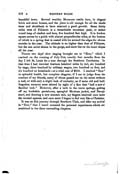
[p. 316]
beautiful town. Several wealthy Mormons reside here, in elegant brick and stone houses, and the place is old enough for all the shade trees and shrubbery to have attained a good growth. Some thirty miles west of Fillmore is a remarkable mountain peak, or rather round heap of cinders and lava, five hundred feet high. It is broken square across by a gulch with almost perpendicular sides, at the bottom of which is a spring that is coated with ice around the edges for eleven months in the year. The altitude is no higher than that of Fillmore, but the sun never shines in the gorge, and snow lies on the inner slopes all the year.
Thence two days' slow staging brought me to "Zion," which I reached on the evening of July 21st, exactly four months from the day I left St. Louis for a tour through the Southern Territories. In that time I had traveled fourteen hundred miles by rail, six hundred by stage, three hundred by military wagon, two hundred on foot, and six hundred on horseback—at a total cost of $535. I reached "Zion" in splendid health, but complete disguise, if I am to judge from the conduct of my friends, many of whom passed me on the street without a nod, or with only a slight look of curiosity, as if some old and half-forgotten memory were stirred by sight of a face that "had a' sort o' familiar look." However, after a bath in the warm springs, getting off my buckskin pantaloons, spangled Mexican jacket, and Navajo scarf, and donning a new summer suit, my fingers received once more the wonted squeeze, and once more I began to feel very like a Christian.
It was on this journey through Southern Utah, and after my arrival in "Zion," that I heard narrated the personal experiences which are combined in the three succeeding chapters.
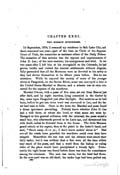
[p. 490]
CHAPTER XXXI.
THE MORMON MURDERERS.
IN September, 1874, I resumed my residence in Salt Lake City, and there remained one year—part of the time as Clerk of the Supreme Court of Utah, the remainder as assistant editor of the Daily Tribune. The sensation of that autumn was the capture and imprisonment of John D. Lee; of the next summer, his arraignment and trial. In the two years after I left him at his stronghold on the Colorado, he had grown bolder and visited the nearest settlements without disguise, fully persuaded that all the Mormons were as devoted to his safety as they had shown themselves to be fifteen years before. But he was mistaken. While he enjoyed the society of some of his younger wives at Panguitch, on the Sevier River, some one conveyed a hint to the United States Marshal at Beaver, and a scheme was at once concerted for the capture of the murderer.
Marshal Owens, with a posse of five men, set out from Beaver just after dark, and by night marches, lying concealed in the timber by day, came upon Panguitch just after daylight. But cautious as he had been, before he got into town word was conveyed to Lee, and the latter had time to hide. Once in the town the Marshal and posse found a dense ignorance prevailing. Nobody knew whether John D. Lee had a wife there, or where she lived, or what name she went by. Enraged at this general collusion with the criminal, the posse seized a small boy, who afterwards proved to be Lee's son, and threatened him with death unless he directed them to the house. The little Mormon gazed calmly at his captor, then at the pistol in the latter's hand, and said, "Shoot away, d—n ye; I don't know nothin' about it." Had not all the roads been guarded, the murderer could even then have escaped. Meanwhile the sun rose and the citizens went about their daily tasks; but it was evident that a few were all the time within easy reach of the posse, and that a word from the bishop or ruling elder of the place would have precipitated a bloody fight. Fortunately the right house was found before there was time for consultation among the criminals. The nest was warm, but the bird had flown. In the cow-yard was an old shed; the under logs had been pulled out,
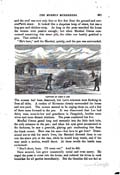
[p. 491]
and the roof was now only four or five feet from the ground and covered with straw. It looked like a shapeless heap of straw, but was a hog-pen and chicken-coop. As long as the posse searched the house the women were passive enough; but when Marshal Owens commenced examining this straw pile, the older one hastily grabbed a gun. That settled it.
"He's here," said the Marshal, quietly, and the pen was surrounded.
CAPTURE OF JOHN D. LEE
The woman had been disarmed, but Lee's retainers were flocking in from all sides. A cordon of Mormons already surrounded the house and cow-yard. The women seemed to be urging them on, and a few of them came forward to the pen. It was discovered that Lee had thirty sons, sons-in-law and grandsons in Panguitch, besides some wives and more distant relations. The posse numbered but five.
Marshal Owens gazed long and earnestly into the little dark hole, the only entrance to the pen; and when his eyes grew accustomed to the darkness, he saw a greenish, glaring pair confronting him from the black corner. Here was his man—but how to get him? Determined not to risk his men's lives, the Marshal directed them to cut into the straw pile at the rear, while he would keep watch, and if the man made a motion, would shoot. At these words the inside man exclaimed:
"Don't shoot, boys. I'll come out." And he did.
Once secured, Lee grew unnaturally social and even merry. He urged the posse to come into the house, and ordered his wives to cook breakfast for all parties immediately. But the Gentiles did not feel so

[p. 492]
merry. The whole town appeared to be concentrating in that vicinity. It was evident the place contained at least seventy-five fighting men, and that they only waited a signal from Lee, or some one else, to begin. Directing his men to keep their weapons in constant readiness, and placing two of them as a special guard over Lee, the Marshal informed that worthy that the first move towards a rescue would be the signal for his instant death. The signal was not given. The posse ate breakfast, silently and in haste, and departed for the hills, the whole population waiting and watching. By forced marches the Gentiles reached Beaver next morning, and John D. Lee soon reposed in the strong room at Camp Cameron with fifty pounds of iron on his person.
Before entering on the details of his trial it is necessary to give some particulars of the crime, a thousand times told, for which he finally suffered. It was the result of three motives, prominent in the order named: revenge, lust for plunder and fanaticism. When the Latter-day Saints left Illinois, 20,000 strong, they hurled back apostolic curses at the whole Gentile nation. That nation, they said, had rejected the gospel by the murder of the Prophet and Patriarch, and should perish in its sins. In the Rocky Mountains the Saints would establish a kingdom, and in due time take vengeance on their enemies. In the endowment oaths, every true Mormon was sworn to avenge the death of Joseph Smith. A peculiar system of diplomacy and attempt to establish a theocracy in the States, had brought the Saints into conflict with the Americans, and now that conflict was made the means of uniting them more solidly against the Gentile world. With the doctrine of a temporal kingdom came in the long train of Hebraic similes: the Church was in bondage in Egypt; it was in the wilderness of Zin; it was to overthrow the Amalekites (Missourians), and repeat all the wonderful achievements in the fruitful annals of Israel. And as the Amalekites resisted, and many Mormons grew disafected, all the bloody devices of the ancient Hebrews were legalized, and thus Mormonism became the terrible thing it was in 1856 and '57.
When they first settled in Utah they determined their government should be a pure theocracy, but it was necessary to have some form which the United States would recognize, to give jurisdiction over Gentiles who might pass through or tarry in Zion. A State government was agreed upon. Its boundaries were declared to be from the summit of the Sierras to that of the Rocky Mountains, and from latitude 42° down to the Mohave Desert and divide of the Colorado plateau; it contained all the present Utah and Nevada, with consider-
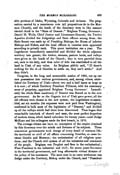
[p. 493]
able portions of Idaho, Wyoming, Colorado and Arizona. The proposition carried by a unanimous vote (all propositions do in the Mormon Church), and the heads of the theocracy were in like manner elected chiefs in the "State of Deseret:" Brigham Young, Governor; Daniel H. Wells, Chief Justice and Lieutenant-General; the Twelve Apostles divided the Judgeships and State officers among them; the State Senate was made up of Presiding Bishops, the House of inferior Bishops and Elders, and the local oilicers in counties were appointed according to priestly rank. This queer institution ran a year. The Legislature immediately assembled and divided the whole adjacent territory into grants; the timber, streams, pasture lands, and valleys were given to the heads of the Church; they in turn parceled them out, each to his laity, and thus color of title was established to all the land in Utah of any value. As Brigham pithily said, "If there's nothing for the d—d Gentiles to settle on, they can't settle." And they didn't.
Congress, in the long and memorable session of 1850, cut up our new possessions into various governments, and, among others, established the Territory of Utah—about two and a half times as large as it is now; of which Territory President Fillmore, with his customary sense of propriety, appointed Brigham Young Governor! Immediately the whole State machinery of Deseret was isoated on to the new government. As far as the Organic Act of Utah gave power, all the old officials were chosen in the new system; the Legislature reassembled, sat six months (its expenses were now paid from Washington), confirmed in bulk most of the legislation of "Deseret," and divided up all the valleys which had since been discovered. Thus began that remarkable interlock of church and state, the most perfect despotism of modern times, which lasted unbroken for twenty years—until Judge McKean and his colleagues made the first breach, in 1870.
The average citizen can have no conception of the empire obtained by this theocracy over the minds and fortunes of its subjects. Three concurrent governments took charge of every detail of common life: the territorial or civil of all afairs concerning Gentiles, or cases between Gentile and Mormon; the ecclesiastical of all religious questions; and the Church civil system of all the industries and commerce of the people. Brigham was Prophet and Seer in the ecclesiastical; First President in the industrial and civil; for seven years Governor in the territorial government, and long afterwards virtual dictator of the policy of his successors. The same man in an outer settlement was Judge under the Territory, Bishop under the Church,and "President
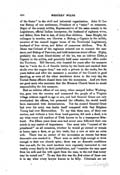
[p. 494]
of the Stake" in the civil and industrial organization. John D. Lee was Bishop of one settlement, President of a "stake" or commune, Major of the county militia, Representative of the same county in the Legislature, official Indian interpreter, the husband of eighteen wives, and father, from first to last, of sixty-four children. Isaac Haight, his colleague in murder, was likewise a Bishop, a Captain in the militia, member of the council (upper house of the Territorial Legislature), husband of four wives, and father of numerous children. Wm. H. Dame was Colonel of the regiment ordered out to commit the massacre, and Bishop of Parowan, and held numerous minor offices. Higby, probably the most blood-thirsty of the lot, was an inferior Elder,a Captain in the militia, and generally held some executive office under the Territory. Bill Stewart, who boasted for years after the massacre that he "took the d—d Gentile babies by the heels and cracked their skulls over the wagon tires," was only a private in the ranks, but for years before and after the massacre a member of the Church in good standing, as were all the other murderers down to the very day the United States officers chased them into the mountains. And yet there are good souls who maintain that the Mormon Church bears no moral responsibility for this massacre.
Had an inferior officer of our army, when camped before Washington, gone into the country and massacred the people of a Virginia village without regard to age or sex, and had General Grant not only overlooked the offense, but promoted the offender, the world would have resounded with denunciations. Yet the control General Grant had over his army was laxity itself compared with that Brigham Young had over Mormondom. To say that these men, of their own motion, and without a hint from head-quarters, did such a deed, is to say what every old resident of Utah knows to be a transparent falsehood. For fifteen years these men had never once followed their own minds in any matter of importance. One must take "counsel of the priesthood" on all occasions, whether he would go abroad or remain at home, open a farm, or go into trade, buy a cow or take an extra wife. There was no corner of the mountains so remote but some theocratic arm reached it. There were no walls high enough or thick enough to shut out church spies; there was no domestic confidence that was safe, for the ward teachers were expressly instructed to visit weekly every family in their jurisdiction, and "examine the man apart from his wife and the wife apart from the man, to the end that heresy may be rooted out." To say that this was the first crime of these men is to say what every lawyer knows to be folly. Criminals are not

[p. 495]
made in a day. Men do not become utter and conscienceless villains just for one occasion. Whole communities, do not suddenly turn to assassins. Starkie and Greenleaf teach a sounder philosophy of crime. The whole previous life-time of the Mormon Church was no more than enough to educate men to such action.
Perhaps all these causes would not have been sufficient, but the year 1856 was full of disaster and incitements to fanaticism. The Church leaders had determined that immigrants from Europe should walk from the Missouri to Salt Lake City, and trundle hand-carts loaded with their baggage; and the first attempt resulted in frightful sufering and three hundred deaths. This dire calamity appeared to excite an epidemic madness in Utah.
The "Reformation" which had already set in, now became a veritable reign of terror. The doctrine of "blood atonement," or killing men to save their souls, was taught by Brigham Young, Orson Hyde, and others. In all the sermons of that period one will not find twenty quotations from the New Testament, but every page is red with the bloody maxims of the Mosaic code.
Meanwhile, Parley P. Pratt, "Isaiah of the Latter-day Church," was killed in Arkansas by Hector McLean, whose wife Pratt had taken away some time before. To the Gentiles this would seem but the rash act of an outraged husband; to the Mormons it appeared the murder of an able apostle, who had obeyed the "celestial laws," in taking another man's wife. The spring of 1857 found the Mormon community in a mixed state of fanatic enthusiasm, grief for the lost, zeal for the cause, and fierce anger against the whole American race. While in this state the news arrived that President Buchanan had removed Brigham Young from the Governorship, and determined to station a part of the army in Utah. The immediate consequences were frightful.
A yell of rage and defiance sounded from one end of the Territory to the other. The few American officials who remained slipped out at once. Dr. Hurt, Indian agent, did not trust the roads, but was piloted through the mountains by the Utes. All the apostates who could do so lied at once. The rest held their peace, or outdid the orthodox in their zeal. Several frightful murders and still more frightful mutilations took place. To deprive a dangerous man of virility was regarded almost as a joke. Dozens of cases are known to have occurred between 1856 and 1863—those being the years in which the "blood atonement" doctrine was preached. All opposition was silenced, and the people were hot for war. Wheat was dried and
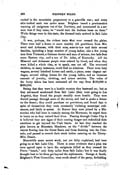
[p. 496]
cached in the mountains preparatory to a guerrilla war; and every able-bodied male was under arms. Brigham issued a proclamation warning all emigrants out of the Territory, and announced in a sermon that if they came, he "would turn the Indians loose on them." While things were in this state, the doomed train arrived in Salt Lake City.
It was, perhaps, the richest train that ever crossed the plains. There were half a dozen or more wealthy old gentlemen from Missouri and Arkansas, with their sons, sons-in-law and their several families, including a large number of young ladies; also a few young men from Vermont, a German doctor and man of science, two lads from some Eastern city, and a son of Dr. Aden, of Kentucky. All the Missouri and Arkansas people were related by blood, and when they were killed a whole clan, so to speak, was cut off. The recovered children, in many instances, could find no relations. There were forty wagons, several hundred horses and cattle, a piano, some elegant carriages, several riding horses for the young ladies, and an immense amount of jewelry, clothing, and minor articles. The value of the booty taken has been estimated all the way from $150,000 to $300,000.
Seeing that they were in a hostile country they hastened on; but as they advanced southward from Salt Lake (they were going to Los Angeles), they found the people steadily more hostile. They were denied passage through some of the towns, and had to make a detour on the desert; they could purchase no provisions, and found that in spite of themselves they were constantly violating municipal ordinances, and liable to arrest. At Beaver they were joined by a Missourian who had been in custody among the Mormons; he urged them to hurry on as they valued their lives. Passing through Cedar City it is believed they saw signs of their coming danger and redoubled their exertions to get beyond the Utah limits. At last they reached the glen known as Mountain Meadows, on the "divide" between the waters flowing into the Great Basin and those draining into the Colorado, and paused to recruit their stock before entering on the Ninety-Mile Desert.
Meanwhile some secret work, not yet fully explained, had been going on at Salt Lake City. There is some evidence that a plan was once agreed upon to have the emigrants killed as they crossed the Provo "bench," only forty miles from Salt Lake; but it was finally thought best to let them get beyond the settlements. George A. Smith, Brigham's First Councillor, went south ahead of the party, forbidding
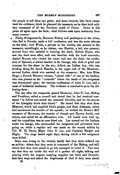
[p. 497]
the people to sell them any grain; and some lawyers, who have examined the evidence, think he planned the massacre, as he then held military command of all the Territory south of Provo. Down to this point all agree upon the facts; what follows rests upon testimony from many sources:
Philip Klingensmith, Mormon Bishop and participant in the crime, who fled to Nevada, made a full confession, and was the main witness on the trial; Joel White, a private in the militia, also present at the massacre, unwillingly, as he claims; one Hawley, a lad, also present; several boys who assisted in burying the dead; Robert Keyes, who saw the dead soon after, and was familiar with the local accounts; Asahel Bennet, who visited the scene and saw the dead; the confession of Spencer, a school teacher in St. George, who died of grief and remorse for his share in the act; Albert, an Indian boy, who was herding sheep for Jacob Hamlin, in the upper end of the Meadows; several Indian chiefs who assisted at the massacre; Mrs. Ann Eliza Hoge, a French Mormon woman, "plural wife" of one of the leaders, who was present at the "councils" where the death of the emigrants was determined upon; the various confessions of John D. Lee, and a mass of collateral testimony. The evidence is conclusive as to the following facts:
The day after the emigrants passed Harmony, John D. Lee, Bishop and President, called a council and stated that he had received command "to follow and attack the accursed Gentiles, and let the arrows of the Almighty drink their blood." He stated that they were from Missouri, which had expelled God's people, and from Arkansas, which had sanctioned the murder of the apostle; he recited the Hawn's Mill massacre of Mormons, the murder of Joseph and Hyrum Smith, and others, and called for an affirmative vote. All hands were held up, and the expedition was at once fitted out. Lee turned out the Indians under his charge, who surrounded the emigrants and prevented their going on, while a regular call was made on the county militia by Col. W. H. Dame, Major John D. Lee, and Captains Haight and Higby. The siege lasted eight days, during which a few emigrants were killed.
Some men living in the vicinity testify that they were ordered out as militia; others that they went at command of the Bishop, and still others that they were asked to go but managed to avoid it. Two men say that they sat inside the wall of a garden all night, talking and praying while the wagons carrying supplies ran back and forward; that they wept and asked the forgiveness of God if they were about
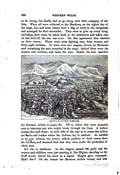
[p. 498]
to do wrong, but finally had to go along with their company of militia. When all were collected at the Meadows, on the eighth day of the siege, Lee and some others bore a flag of truce to the emigrants, and arranged for their surrender. They were to give up every thing, including their arms, be taken back to the settlement and taken care of, but held till the war was over. On this agreement they started on their return. There were sixty fighting men, forty women, and forty-eight children. In front were two wagons, driven by Mormons and containing the men wounded in the siege; behind them were the women and children, and lastly the men. Beside the men marched
MOUNTAIN MEADOW MASSACRE
the Mormon militia in single file. Off on either side were mounted men to intercept any who might break through the lines. A hollow crosses the road there; on each side of the way as it enters the hollow are rocks and bushes where the Indians lay in ambush. As testified to by one witness, the women talked joyfully of their rescue from the Indians, and thanked God that they were under the protection of white men.All was in readiness. As the wagons passed the gully and the women and children were just entering it, Ike Higbee, standing on the bluff above, waved his hand as a signal. Haight gave command: Halt! fire!! On the instant the Mormon militia turned, and with
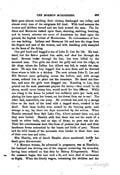
[p. 499]
their guns almost touching their victims, discharged one volley, and almost every man of the emigrants fell dead. With loud screams the women and children turned and ran back toward the men. The Indians and Mormons rushed upon them, shooting, stabbing, braining, and in twenty minutes six score of Americans lay dead upon the ground, the hapless victims of Mormonism. No circumstance of horror was lacking. Indians and Mormons bit and tore the rings from the fingers and ears of the women, and with insulting yells trampled on the faces of the dying.
One girl knelt and begged a son of John D. Lee for life. He hesitated, but the father pushed him aside, and shot her through the head. Several broke through the line, but were killed by the mounted men. Two girls ran down the gully and over the ridge, to the slope where the Indian boy Albert was hid, to watch the massacre. He says that they begged him to save them, and he directed them where to hide in a thicket. The next minute John D. Lee and Bill Stewart came galloping across the hollow, and, with savage curses, ordered him to pint out the runaways. He dared not disobey, and soon the girls were dragged out. Kneeling to Lee, they poured out the most passionate prayers for mercy—they would be his slaves, would never betray him, would work for him forever. While one clung to his knees he jerked her suddenly upon her back, and, placing his knee upon her breast, cut her throat from ear to ear! The other had, meanwhile, run away. He overtook her, and, by a savage blow on the back of the head with a ragged stone, crushed in her skull. Both these bodies were missed by the burying party, and, strange to say, lay there ten days untouched by the wolves. When Hamlin returned from Salt Lake City, Albert pointed them out, and they were buried. Hamlin adds that there was not the mark of a tooth on either body, and no sign of decay, so pure was the air. Their fair conntenances were like those of persons just dead, and their handsome forms untouched by the beasts and birds of prey. Nature and the wild beasts of the mountain were kinder to them than men of their own race and color.
Mrs. Hamlin, wife of Jacob Hamlin above mentioned, before her death gave this account:
"A Mormon woman, far advanced in pregnancy, was at Hamlin's; her husband was driving one of the wagons containing the wounded, having been ordered on that duty by Bishop Klingensmith. When the massacre began this man took a fit, and soon died of excitement or fright. When the bloody wagon, containing the children and the
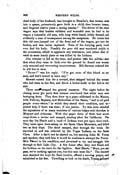
[p. 500]
dead body of her husband, was brought to Hamlin's, this woman went into a spasm, prematurely gave birth to a child, then became insane, and lingered twelve years a raving maniac." The driver of the other wagon says that besides children and wounded men he had in his wagon a venerable old man, with long white beard, richly dressed, and evidently a man of consequence among the emigrants. He insists that this old man jumped out of the front end of the wagon, got into the bushes, and was never captured. None of the burying party could ever find his body. Possibly the poor old man wandered awhile in the mountains, afraid to approach any settlement, and either died of want in some lonely place or was killed by the Indians.
One witness—a lad at the time, and present wth the militia—says that when they came to look over the ground he found one woman "only stunned and recovering consciousness. Bill Stewart ordered him to kill her at once.
"Never!" was his reply. "I've got none of this blood on my soul, and don't intend to have any."
Stewart cursed him for a coward, then stepped behind the woman who had risen to her feet, and drove a bowie-knife to the hilt in her side.
Three men escaped the general massacre. The night before the closing scene the party first became convinced that white men were besieging them. They then drew up a paper addressed to the Masons, Odd Fellows, Baptists, and Methodists of the States, "and to all good people every-where," in which they stated their condition, and implored help if there was time; if not,justice. To this were attached the signatures of so many members of various lodges and churches in Missouri and Arkansas. With this paper three of their best scouts crept down a ravine and escaped, starting afoot for California. The next day Ira Hatch and a band of Indians were put upon their track. They came upon them asleep on the Santa Clara Mountain, and killed two as they slept. The third escaped, shot through the wrist. He traveled on and was relieved by the Vegas Indians, on the Santa Clara. After a day's rest he started on, but meeting John M. Young and another, they told him it would be madness to attempt the Ninety-Mile desert in his condition, and promised to try and smuggle him through to Salt Lake City. A few hours after, they met Hatch and his Indians on the hunt for the fugitive. Said Hatch, "Boys, you can pass, we've nothing against you, but this man must die." The doomed man thanked the boys for their trouble, ofered a moving prayer, and submitted to his fate. Unwilling to look on his death, Young galloped
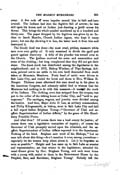
[p. 501]
away. A few rods off some impulse caused him to halt and turn around. The Indians had shot the fugitive full of arrows; he was still upon his knees, and an Indian just drawing a knife across his throat. This brings the whole number murdered up to a hundred and thirty-one. The paper dropped by the fugitives was given by an Indian to Jacob Hamlin, Church Indian Agent, who kept it many years; but one day showing it to Lee, the latter took it from him and destroyed it.
The bloody deed was done—the most cruel, pitiless, massacre white men were ever guilty of. It only remained to divide the spoil and guard against discovery. A tithe of the plunder was turned over to the Church. The Indians received the arms and ammunition and some of the clothing; but long complained that they did not get their share. The finest stock was distributed among the dignitaries in the neighborhood; and in 1872, Bishop Windsor, of Pipe Springs, Arizona, pointed out to me cattle in his own herd descended from stock taken at Mountain Meadows. Forty head of cattle were driven to Salt Lake City, and traded for boots and shoes to Hon. William H. Hooper. Thirteen years afterward this man stood up in his place in the American Congress, and solemnly called God to witness that the Mormons had nothing to do with this massacre—it was all the work of the Indians. The clothing, even that stripped from the corpses, was put in the cellar of the tithing house at Cedar City, and "sold to pay expenses." The carriages, wagons, and jewelry were divided among the leaders. And then, Major John D. Lee, as military commandant, and Philip Klingensmith, as bishop, went to Salt Lake City and laid a full report before Brigham Young—" Governor of Utah and ex-officio Superintendent of Indian Affairs," by the grace of His Excellency Franklin Pierce.
And what then? Of course there was a loud outcry for justice; of course there was a legislative committee of inquiry; of course the Governor of Utah promptly moved upon the criminals, and the ex-officio Superintendent of Indian Affairs reported it to the department. Nothing of the kind. Brigham sent word to the Bishops, "Let no man talk about this thing—do n't mention it even among yourselves—especially let the women keep silent about it. Let it be forgotten as soon as possible." Haight and Lee came up to Salt Lake as senator and representative; sat that winter in the legislature; attended the usual dinner given by Gov. Brigham Young, and each went home with a young wife, sealed to them in the Endowment House by the Prophet, Seer, and Revelator, Brigham Young! Nobody left the

[p. 502]
neighborhood; nobody lost caste. Lee remained a bishop for fourteen
years afterward. Dame is a bishop yet; Higbee is a prominent citizen, and Haight was still a bishop when I last saw him in 1872. The dead were buried; peace was made by Commissioners Powell and McCulloch with King Brigham; a new emigrant road was laid off, lest Gentiles might discover something in passing through the meadows, and no mention of the affair was made in Mormon society or in the Mormon organ, the Deseret News.
And so all was done, and the dread secret was safe. The last adult emigrant had fed the wolves; the only child old enough to remember any thing about it had "disappeared," and the rest, distributed in various settlements, soon looked upon the Mormons as their people, and forgot that they ever had Gentile parents. Even the women, obeying Brigham implicitly, "quit talking about it." Lee called a meeting of all who were at the former council, and swore them to eternal secrecy, under penalty of the punishment invoked in their endowment oaths. Brigham preached in the neighborhood, was the guest of Lee, and urged the brethren "to be united and not tale-bearers, one against another." All avenues of discovery were apparently shut up. The job was a complete one. The secret was safe.
"Ah gentlemen!" said Webster, of a similar case; "that was a terrible mistake. Such a secret is safe nowhere. The universe of God has no corner where the guilty can bestow it and say it is safe. The human heart was not made to be the depository of such a secret. There is no refuge from confession but suicide; and suicide is confession." Even the banded murderers of Mormondom could not keep it. There were too many concerned. There were men with human blood in their hearts; there were women with mothers' milk in their breasts. They could not carry so oppressive a secret. The madness of 1856 and '57 wore itself out. Dazed and bewildered, men slowly emerged from the state of excitement, and asked themselves what had been done. Strange rumors spread northward from settlement to settlement. Some of the boys from Washington County came north after the peace, and met their friends who had served against Johnston's army; and often muttered over their cups that they did not like "the business they had been engaged in down south." A lad in Beaver began to act very strangely—he drank deep of native whisky, and never staggered under it; but told of very strange things that he saw.
Young Spencer wasted to a skeleton, and wrote imploring letters to his bishop and to Brigham Young, begging for some word to re-
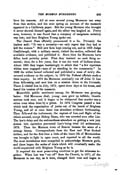
[p. 503]
lieve his remorse. All at once several young Mormons ran away from that section, and the next spring an account of the massacre appeared in a California paper. But the young Mormon who brought it never showed himself again, and the editor was laughed at. Pretty soon, however, it was found that a company of emigrants certainly was lost; and then Brigham Young spoke out.
The Deseret News officially pronounced it a lie. Privately the leaders said: "It was a necessity—we only regret that they had to kill the women." Still new facts kept coming out, and in 1859 Judge Cradlebaugh, with a military escort, visited the section, collected the available evidence, and published it. Since then the Mormons have fallen back point by point. First they insisted no such thing occurred; then, for a few years, that it was the work of Indians alone. About 1865 they began hesitatingly to admit that "a few reprobate whites were engaged—men of no standing in the community." In 1869 the writer hereof collected and published a mass of newly discovered evidence on the subject; in 1870 the Federal oliicials made a little inquiry. In 1871 the Mormons nominally cut off John D. Lee from fellowship, and sent him on a mission down to the Colorado. There I visited him in July, 1872; spent three days at his house, and heard his version ofthe massacre.
Meanwhile public sentiment among the Mormons was growing better. Old Mormons died; young ones grew up infidels; Gentile notions took root, and it began to be whispered that murder was a crime even when done by a priest. In 1874 Congress passed a law which took the organization of juries out of the hands of Brigham Young, and all at once there was abundant evidence forthcoming. Then followed the indictment, the capture of Lee, and flight of the others accused, except Bishop Dame, who was arrested soon after Lee. The law's delay and the awkwardness attendant on getting a new jury system into operation prevented Lee's being tried till midsummer, 1875. Then the Mormon town of Beaver became the scene of a strange drama. Correspondents from the East and West flocked thither, and for the first time a little of the inner life of Mormondom was brought to light in open court, and reported to all the world. The most incredulous were compelled to acknowledge Mormon guilt, and there began the series of trials which will eventually make the world acquainted with Brigham Young as he is.
It required the most persevering exertions to get the witnesses together. When Lee was "cut off" from the Church, in 1871, all the Mormons in one day, as it were, changed their tone and began to
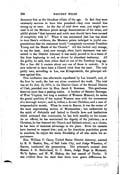
[p. 504]
denounce him as the bloodiest villain of the age. In fact they were extremely anxious to have him punished—they even wanted him strung up at once. As the day of trial drew near, you might have read in all the Mormon prints savage denunciations of his crime, and pitiful plaints "that innocent and noble men should have been accused of complicity with it." When it was announced that Lee was about to turn State's evidence, the Mormon prints indulged in joyful congratulations that his statement would "completely exonerate President Young and the Heads of the Church." All this looked very strange, to say the least. And, sure enough, when Lee's statement was submitted to the District Attorney it was easily proved to be a tissue of lies from beginning to end, as shown by abundant testimony. All the guilty, he said, were either dead or out of the Territory long ago. Not a line did it contain about any one of those in custody. It is now believed to have been a Church trick from the start. The only guilty man, according to Lee, was Klingensmith, the principal witness against him.
This confession was afterwards repudiated by Lee himself; and, of the four he made, the last one alone contained the truth. The trial was set for July 12, 1875, in the District Court of the Second District of Utah, presided over by Hon. Jacob S. Boreman. This gentleman deserves more than a passing notice. A brother of Senator Boreman, of West Virginia, but long a resident of Western Missouri, he unites the genial qualities of the typical Western man with the earnestness of a thorough lawyer; and is, withal, a devout Christian, and a man of irreproachable morals. When he went to Beaver, it was the center of the most unpromising section of Mormondom; but undeterred by the spirit of disloyalty and hatred to Gentile laws and institutions which animated that community, he has held steadily on his course. As an official, he has maintained the dignity of the judiciary; as a Christian, he has fostered the Church and Sabbath-school; as a citizen, he has been of immense advantage to the place. Even his enemies have learned to respect him; and, as the American population grows in numbers, he enjoys the warm friendship of all who make his acquaintance.
Hon. William C. Carey, United States District Attorney, assisted
by R. N. Baskin, Esq., of Salt Lake City, and Judge Wheedon, of Beaver, conducted the prosecution. The prisoner's counsel were Messrs. J. G. Sutherland, G. C. Bates, Judge Hoge (a Mormon), Wells Spicer, and W. W. Bishop, the last named of Pioche. It was evident from the start that there were grave diferences be-
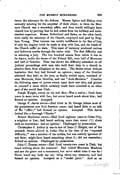
[p. 505]
tweenthe attorneys for the defense. Messrs. Spicer and Bishop were earnestly laboring for the acquittal of their client; to them the Mormon Church was a secondary affair, and they would willingly have cleared Lee by proving that he had orders from his military and ecclesiastical superiors. Messrs. Sutherland and Bates, on the other hand, were really the attorneys of the Church, employed and paid by Brigham Young. That interest was totally indifferent to the fate of Lee, if only the inquiry could be made to stop with him, and the heads of the Church safer no stain. This want of harmony produced curious and ludicrous results through the entire trial. The first difficulty was in selecting a jury. The two hundred names from which it was to be drawn, under the terms of the Poland Bill, were half of Mormons and half of Gentiles. Then was shown the difficulty attendant on all judicial proceedings with men who held their duty to a church to absolve them from allegiance to the state. The Saints swore without hesitation that they had formed no opinion; many of the Gentiles admitted they had; so the jury, as finally settled upon, consisted of nine Mormons, three Gentiles, and one "Jack Mormon." Consider the following cases of jurors sworn upon their voir dire, and picture to yourself a scene which certainly could have occurred in no other part of the world than Utah:
Joseph Knight, sworn on his voir dire—Was a native; lived three years in same town with Lee, but never heard much about him; had formed no opinion. Accepted.
George F. Jarvis sworn—Had lived in St. George (where most of the perpetrators now live) fourteen years; had heard little or no talk of the "affair;" had formed no opinion. Accepted. This Jarvis looked like a thorough "Danite."
Robert Heyborne sworn—Had lived eighteen years in Cedar City, a neighbor to Lee; had heard nothing more than rumor (!!) about such an occurrence; had no opinion! Challenged by prosecution.
Christopher J. Arthur (a son—in—law of Isaac C. Haight, one of the accused) sworn—Lived in Cedar City at the time of the "reported difficulty;" was a member of the militia, but was entirely ignorant of any facts; might have heard something about it; did not remember; formed no opinion. Challenged by prosecution.
John C. Duncan sworn—Had lived twenty-two years in Utah, but heard nothing about the massacre! Had visited Mountain Meadows and saw the grave and a monument, but never asked what it was for! Never heard any body say any thing about any massacre, and had formed no opinion. Accepted as a "model juror." And so on

[p. 506]
through the list. What a world of trouble Brooklyn courts might have saved, if they had allowed Plymouth Church to select jurors.
This sort of thing occupied several days. Meanwhile the deputy marshals were scouring the country in search of witnesses, every sort of obstruction being thrown in their way by the people. The secretiveness and cunning of the Mormon laity renders proof of daring crime a work of extreme diiiiculty. "Keep still and mind your own business," is the standing exhortation to the men. "If you see a dog run by the door with your husband's head in its mouth, say nothing till you have consulted with the bishop," are the exact words in which Brigham counseled the women of this district. Joel White, an important witness, was brought in with great difficulty. Marshal Cross traversed the Great Desert alone, and found Klingensmith in Southern California. On Sunday, July 18th, Lee's "confession" was read by the prosecution, and promptly rejected as unworthy of belief. On Friday, the 23d, the trial at last began. After an able opening address by District Attorney Carey, Robert Keyes was put upon the witness stand, and testified as follows:
"In October, 1857, he passed through Mountain Meadows valley, which is situated south-west of Cedar City. Saw two piles of bodies, one composed of women and children, the other of men; the bodies were entirely nude, and seemed to have been thrown promiscuously together; they appeared to have been massacred. Should judge there were sixty or seventy bodies of women and children; saw one man in that pile; the children were aged from one and two months up to twelve years; the small children were most destroyed by wolves and crows; the throats of some were cut, others stabbed with knives; some had balls through them. All the bodies were more or less torn to pieces, except one, the body of a woman, which lay apart a little south-west of the pile. This showed no signs of decay, and had not been touched by the wild animals. The countenance was placid, and seemed to be asleep. The work was not freshly done—supposed the bodies had been here fifteen or sixteen days. Witness passed the ground October 2d, 1857. There were eleven in the company. Seven went to see the pile of slaughtered men which lay a few rods off. Witness did not go. All the clothing he saw was a stocking on the leg of one of the bodies. The woman lying apart had a bullet hole on the left: side, a little below the heart."
Asahel Bennett, of the same party, testified to substantially the same facts. Then Philip Klingensmith was called, and there was a general movement in the audience. Every eye and ear was strained, and the
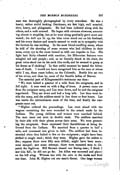
[p. 507]
man was thoroughly photographed by every attendant. He was a heavy, rather stolid looking Dutchman, six feet high, well muscled, slow, heavy, and phlegmatic. He had been indicted along with the others, and a nolle entered. He began with extreme slowness, amounting almost to stupidity, but as he went along gradually grew more animated; his dull eye lit up, the blue veins stood out on his forehead, and his every feature and muscle seemed to work as in sympathy with the horrors he was reciting. In the most blood-curdling scene, where he told of the shooting of some women who had children in their arms, every eye in the room turned as with one impulse to Lee. His light hair fairly vibrated with emotion; his Hibernian features were mingled red and purple; and, as he literally shook in his chair, the great veins stood out on his neck like cords, and he seemed to grasp at his throat as if choking! In that awful moment he tasted the bitterness of death. I would not have recognized him as the man at whose table I ate, three years before, on the Colorado. Beside him sat two of his wives, and close by, most of the Gentile ladies of Beaver.
The material part of Klingensmith's testimony ran thus:
"We were halted a quarter of a mile from the emigrants, and in full sight. A man went on with a flag of truce. A person came out from the emigrant camp, and Lee went down, and he and the emigrant negotiated. They sat down and had a long talk. Lee then went inside the camp, and the soldiers stood in line three or four hours. Lee was inside the intrenchment most of the time, and finally the emigrants came out.
"Higbee ordered the proceedings. Lee went ahead with the wagons containing the men wounded in the attack made by the Indians. The young children and women were marched behind. The men came out next in double rank. The soldiers marched by their side with their pieces across their arms. We were protecting the emigrants. Some expressed their thankfulness at being delivered from the Indians. We marched from a quarter to half a mile, and command was given to halt. The soldiers had been instructed when they halted to fire on the emigrants; might have been shifted to single rank; think they were. Higbee gave the orders to fire; suppose there were fifty men killed; might have been more; none escaped; saw some attempt; there were mounted men to dispatch the fugitives. Bill Stewart chased one fleeing man; I think I saw him fall; he did not go far. Ira Allen was mounted and placed on the left wing. Witness was with the men in the ranks and tired one time. John M. Higbee cut one man's throat. One large woman
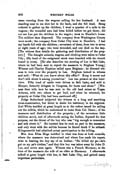
[p. 508]
came running from the wagons calling for her husband. A man standing near to me shot her in the back, and she fell dead. Being ordered to gather up the children, I went a quarter of a mile to the wagons; the wounded men had been killed before we got there; did not see Lee put the children in the wagon; went to Hamlin's house. The soldiers then dispersed. The company from Washington County went south; the company from Cedar City went to Hamlin's. I had my hands full with the children; seventeen of them, from two to seven or eight years of age; two were wounded, and one died on the way. [The witness then details the gathering and distribution of the property.] The draught animals, wagons, and clothing were taken to Cedar City; Fifty head of the emigrants' stock were branded with the church brand (a cross). [He also describes the meeting of Lee in Salt Lake, where he had been sent to report the massacre to Brigham Young.] Witness and Charley Hopkins called upon Brigham; he directed witness to turn over the property to Lee. Brigham turned to witness and said: 'What do you know about this affair? Keep it secret and don't talk about it among yourselves.' Lee was present at this interview. Fifty head of cattle were driven to Salt Lake, and sold to Hooper, formerly delegate to Congress, for boots and shoes." [Witness then tells how he was sent to the old lead mines at Vegas, Arizona, with two others to get lead, and when he returned, the property at Cedar City had been auctioned off.]
Judge Sutherland subjected the witness to a long and searching cross-examination, but failed to shake his testimony in the slightest. Joel White testified at great length as to the orders issued for calling out the militia, which he understood to come from Col. Dame; of the massacre and distribution of the property; of the seventeen little children saved, and of afterwards seeing the Indian, deputed for that purpose, cut the throat of the boy who was "big enough to remember and talk about it." He insisted that he took no part in the massacre, and only went with the militia because he feared death if he refused. Klingensmith had admitted actual participation in the killing.
Mrs. Ann Eliza Hoge testified to what was done at both councils, where the massacre was determined and where Lee made his report. Also to hearing the boy say of an Indian: "He killed my pa—he's got on my pa's clothes," and that this boy was taken away by John D. Lee, and never seen again. Witness was a French Mormon; at the time of the massacre the wife of an elder at Harmony. I afterwards talked at great length with her, in Salt Lake City, and gained many important particulars.
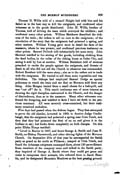
[p. 509]
Thomas D. Willis told of a council Haight had with him and his father as to the best way to kill the emigrants, and confirmed other witnesses as to the goods distributed. John H. Willis, brother of Thomas, told of driving the team which conveyed the children; and confirmed many other points. William Matthews described the richness of the train; the orders to sell no corn to the emigrants; of the circulation of the story that the emigrants had poisoned a spring, and other matters. William Young gave more in detail the facts of the massacre, where he was present, and confirmed previous testimony on other points. Samuel Pollock told substantially the same story. John Sherratt testified to the storing of the goods, including clothing from the dead bodies, in the cellar of the tithing house at Cedar City, and seeing it sold by Lee at auction. William Bradshaw told of sermons preached to excite the people against the emigrants, and threats of death to all who did not aid the Church in whatever was commanded. Robert Kershaw told the same story; also as to the orders not to trade with the emigrants. He wanted to sell them some vegetables and was forbidden. The bishops had employed Samuel Dodge as special policeman to watch the train and see that no Mormon sold them any thing. John Morgan traded them a small cheese for a bed-quilt, and was "cut off" for it. This man's testimony was of more interest as showing the rigid discipline maintained in the Church, and the danger of disobedience, than as to the massacre. Many other witnesses confirmed the foregoing, and testified to facts I have set forth in the previous summary. All were severely cross-examined, but their testimony remained unshaken.
Five days had passed when the defense began. They first attempted to prove the old slander, invented in 1859, to deceive Judge Cradlebaugh, that the emigrants had poisoned a spring near Corn Creek, and then that they had poisoned the flesh of an ox and given it to the Indians to eat; but broke down completely on both charges. On this point Elisha Hoops testified:
"Lived in Beaver in 1857, and knew George A. Smith and Jesse N. Smith, ex-Bishop Farnsworth, and other shining lights of the Mormon Church. On September 27th of that year he accompanied the Smith party as guard as far north as Fillmore; camped at Corn Creek, and found the Arkansas emigrants encamped there, about 150 paces distant. Some members of the company came and talked to the Smith party; they inquired of George A. Smith where they could get grass and water to recuperate their animals, who referred them to Jacob Hamlin, and he designated Mountain Meadows as the best grazing ground.
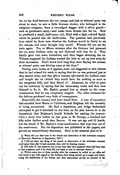
[p. 510]
An ox lay dead between the two camps, and just as witness" party was about to start, he saw a little German doctor, who belonged to the emigrant company, draw a two-edged dagger with a silver guard—such as gentlemen carry—and make three thrusts into the ox. Next he produced a small, half-ounce vial, filled with a light colored liquid, which he poured into the knife-holes. The question had previously been asked by these men whether the Indians would be likely to eat the carcass, and some thought they would. Witness did not see the train again. Ten or fifteen minutes after the German had poisoned the ox, some Indians came up and dickered with him for it. They finally gave him some buckskins, and then began skinning the ox. Witness supposed the Indians wanted the hide to cut up into soles for their moccasins. Don't know how long they were flaying the animal, as witness' party was driving away at the time."
During noon recess, as it appears, some one suggested to this witness that he had missed his mark in saying that the ox was poisoned just as they started away, and that fifteen minutes afterwards the Indians came and bought the ox (which they could have for nothing as soon as the emigrants left), and then flayed it! Afternoon he tried to piece out his testimony by saying that the hame-strap broke and they were delayed to fix it. Mr. Baskin pressed him so closely on the cross examination that he was completely tangled. The other witnesses for the defense produced very little of consequence.
Meanwhile the country had been heard from. A roar of execration had sounded from Maine to California, and Brigham felt the necessity of being exonerated. He filed a deposition, and Judge Sutherland attempted to get it admitted on the trial, on the plea (sworn to in the deposition) that Brigham's health forbade his making the journey. Only a short time before he had gone to St. George, a hundred and fifty miles further south than Beaver. It was not age and ill health, but the dread of Mr. Baskin's cross-examination that kept him out of the court-room. But his deposition was published in the papers, and proved an extraordinary document. Here is the material part of it:
Q. When did you first hear of the attack and destruction of this Arkansas company at Mountain Meadows, in September, 1857?
A. I did not learn any thing of the attack or destruction of the Arkansas company until some time after it had occurred, then only by flosting rumors.
Q. Did John D. Lee report to you at any time after this massacre what had been done at that massacre; and if so, what did you reply to him in reference thereto?
A. Within some two or three months after the massacre he called at my office and had much to say with regard to the Indians, their being stirred up to anger and threatening the settlements of the whites, and then commenced giving an account of the
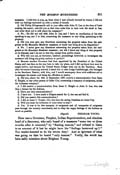
[p. 511]
massacre. I told him to stop, as, from what I had already learned by rumor, I did not wish my feelings harrowed up with a recital of details.
Q. Did Philip Klingensmith call at your office with John D. Lee, at the time of Lee's making his report; and did you at that time order him to turn over the stock to Lee, and order them not to talk about the massacre?
A. No. He did not call with John D. Lee, and I have no recollection of his ever speaking to me, nor I to him, concerning the massacre or any thing pertaining to the property.
Q. Did you ever give any directions concerning the property taken from the emigrants at the Mountain Meadows massacre, or know any thing as to its disposition?
A. No. I never gave any directions concerning the property taken from the emigrants at the Mountain Meadows massacre; nor did I know any thing of that property or its disposal, and I do not to this day, except from public rumor.
Q. Why did you not, as Governor, institute proceedings forthwith to investigate the massacre and bring the guilty authors to justice?
A. Because another Governor had been appointed by the President of the United States, and was then on the way here to take my place, and I did not know how soon he might arrive; and because the United States Judges were not in the Territory. Soon after Governor Cumming arrived, I asked him to take Judge Cradlebaugh, who belonged to the Southern District, with him, and I would accompany them with sufficient aid to investigate the matter and bring the offenders tc justice.
Q. Did you, about the 10th of September, 1857, receive a communication from Isaac, or any other person of Cedar City, concerning a company of emigrants, called the Arkansas company?
A. I did receive a communication from Isaac C. Haight or John D. Lee, who was then a farmer for the Indians.
Q. Have you that communication?
A. I have not. I have made a diligent search for it, but can not find it.
Q. Did you answer this communication?
A. I did, to Isaac C. Haight, who was then the acting President at Cedar City.
Q. Will you state the substance of your letter to him?
A. Yes. It was to let this company of emigrants and all companies of emigrants pass through the country unmolested, and to allay the angry feelings of the Indians as much as possible.
(Signed) BRIGHAM YOUNG.
Here was a Governor, Prophet, Indian Superintendent, and absolute head of a theocracy, who only heard of a massacre "some two or three months after it occurred," by "floating rumors," and refused to listen to an account of it lest he might have his "feelings harrowed up!!" Too tender-hearted to do his sworn duty! And so ignorant of what was going on that he heard "only rumors.” Verily, the world has been sadly mistaken about Brigham Young.
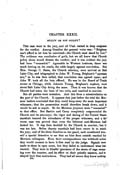
[p. 512]
CHAPTER XXXII.
GUILTY on NOT GUILTY?
THE case went to the jury, and all Utah waited in deep suspense for the verdict. Among Gentiles the general voice was: "Brigham can't afford to let him be convicted—the Church must stand by Lee." The evidence was conclusive of guilt, but we all knew that Church policy alone would dictate the verdict; and it was evident the jury had been "counseled." Agreeable to Western instincts, there was much betting on the result, the odds largely against conviction. But Hon. George C. Bates, the Church attorney, soon arrived at Salt Lake City, and telegraphed to John W. Young, Brigham's "apostate son," as he was then called, that conviction was agreed upon; and John W. took all the bets offered. He was in the Board of Trade rooms at Chicago, while Johnnie Young, Brigham's nephew, went about Salt Lake City doing the same. Then it was known that the Church had taken the least of two evils, and resolved to convict.
But all parties were mistaken. And this from a miscalculation on the part of the Church. It appears that just before the trial the Mormon leaders concluded that they could keep away the most important witnesses; that the prosecution would therefore break down, and it would be safe to acquit. So the Mormon jurymen were "counseled" to that effect. But Baskin and Carey completely outgeneraled the Church and its attorneys; the vigor and daring of the United States marshals insured the attendance of the proper witnesses, and a far worse case was proved than even the bitterest anti-Mormon had looked for. It was then decided by the Church to convict; but it was too late. Seven deputy marshals had been sworn in to watch the jury; and of the three Gentiles on the panel, each constituted himself a special detective to see that no hint from outside reached his Mormon colleagues. Even their correspondence was withheld unless they would consent to have it first read by the judge. Signals were made to them in open court, but they failed to understand what was wanted. They were in blissful ignorance of the storm of rage sweeping over the country, and its efect on their priestly masters, and so obeyed their first instructions. They had all sworn they knew nothing
SALT LAKE CITY—1877
[p. 513]
of the case; but on reaching the jury room, they proceeded to controvert the testimony for the prosecution by facts within their own knowledge. The vote stood from first to last, nine for acquittal and three for conviction. The majority first installed the Jack-Mormon, J. C. Heister, in the chair, and then one by one delivered elaborate Mormon sermons: against the prosecuting attorneys, against the court and all Federal officials, against the emigrants, against the United States, against all who were not of the Mormon Church or its most subservient tools. It was perhaps the most curious and irregular jury proceeding ever had in any civilized country. The three Gentiles on the panel held their ground for two days, smiling grimly on their foes, and willing to see the latter commit themselves;
One can scarcely say whether the Americans in Utah were pleased or chagrined at the result of this trial. They knew that justice would some day be done, and meanwhile the action of the Church would rouse the indignation of the whole country. But even they had underrated this effect. There was a storm of rage in the Rocky
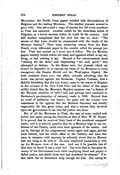
[p. 514]
Mountains; the Pacific Coast papers bristled with denunciations of Brigham and the leading Mormons. The staidest journals seemed to grow wild. One advocated a reign of martial law till every murderer in Utah was executed. Another called for the immediate arrest of Brigham, on a bench warrant, before he could fly the country. And still another complained that the civil law was too slow: "The streets of Salt Lake should be ornamented with the heads of the Mormon leaders." Then came answering echoes from the East. Nearly every influential paper in the country called for prompt justice. Utah was excited as I never saw it before. The six Mormon papers literally bowed before the blast, and appeared afraid to say any thing, or had nothing to say. Beyond a few commonplaces about "waiting for the facts," and deprecating "the mob spirit," they attempted no defense. In the States were two journals which can always be depended on to espouse the cause of the Mormons in every emergency—the Omaha Herald and the Washington Capital. But both remained silent over this affair, virtually admitting that the worst was proved against the Mormons. Captain Codman, with a faithful friendship that did him honor, came to the rescue of Brigham in the columns of the New York Post; and the editor of that paper mildly hinted that the Mountain Meadow massacre was "a feature of the Mormon rebellion of 1857," and had perhaps been condoned by Buchanan's proclamation of amnesty, made in 1858. Beyond these no word of palliation was heard; the press and the country were unanimous in the opinion that the Mormon theocracy was morally responsible for this great crime, and that a solemn duty devolved upon the government to see that full justice was done.
But of all the Mormons in Utah, the case of none excited such horror and regret among the Gentiles as that of Hon. W. H. Hooper. It is proved that he received forty head of the murdered emigrants' cattle; and it is scarcely possible that he, a Mormon high in the confidence of the Church, could have been ignorant of the matter. And yet he, through all his congressional career, again and again, and that most bitterly, laid the whole affair on the Indians; and more than once, in company with senators, he solemnly swore that no Mormon had any thing to do with it. He even employed journalists to write up the Mormon view of the case. And can it be possible that all that time he knew it was a cruel lie? Can it be that he has taken the money of the Government even while employing fraud and perjury to defeat justice, and shield those who had murdered its citizens? If so, this earth has no damnation deep enough for him. But among his
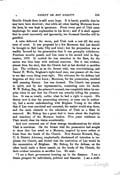
[p. 515]
Gentile friends there is still some hope. It is barely possible that he may have been deceived; that while all other leading Mormons knew the facts, he was kept in ignorance. From every part of Utah came implorings for some explanation in his favor; and if it shall appear that he acted innocently and ignorantly, ten thousand Gentiles will be gratified.
A calm followed the storm, and Utah took a rest till the next term of court. It was proposed by a few Mormons that Lee should be brought to Salt Lake City and tried; but the proposition was so readily favored by the prosecution that it was promptly withdrawn. Fourteen months passed, and Lee came to his second trial in September, 1876. It excited far less attention in the East, for the nation was then busy with national concerns. But it was evident, almost from the start, that the Church had at last decided to sacrifice Lee. The evidence, as on the former trial, was overwhelming, and Daniel H. Wells, Brigham's right-hand man, was present all the time to see that every thing went right. The witnesses for the defense had forgotten all they ever knew; Mormons, for the prosecution, testified with amazing fluency. Lee was doomed. The Church was present in spirit, and by her representative, consenting unto his death. W. W. Bishop, Esq., the prisoner's counsel, was completely taken by surprise when he saw that the Church was actually aiding the prosecuition. It was so totally unlike what he had a right to expect. His theory now is that the prosecuting attorney, or some one in authority, had a secret understanding with Brigham Young to the efect that if Lee were convicted and executed, the matter would stop there, and the main obstacle to the admission of Utah as a State be removed. Mr. Bishop has a great deal to learn about the duplicity and treachery of the Mormon leaders. Five years residence. in Utah would clear his vision considerably.
And now occurred one of those strange transformations for which Utah is notorious. On the former trial the prosecution had sought to show that Lee acted as a Mormon, inspired by some orders or hints from the heads of the Church. Now Sumner Howard, Esq., U. S. District Attorney, emphatically disclaimed all intention to implicate the Church, and hinted that the conviction of Lee would be the exoneration of Brigham. Mr. Bishop, for the defense, on the other hand, made a fierce assault on the heads of the Church, for their evident intention to sacrifice Lee. He said: "I see a State government looming up in the distance. I see a fixture prospect for individuals, political and financial. I see a shift-
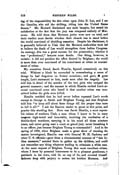
[p. 516]
ing of the responsibility for this crime upon John D. Lee, and I see the Gentiles, who aid the shifting, riding into the United States Senate." Mr. Howard disclaimed any such bargain, but stated his satisfaction at the fact that the jury was composed entirely of Mormons. He told them that Mormon juries were now on trial, and their verdict must decide whether their church was to stand before the world convicted of shielding assassins. Despite his disclaimer, it is generally believed in Utah that the Mormon authorities were led to believe the death of Lee would strengthen them before Congress. As strategy, this was a great success for the prosecution; whether it was "professional," lawyers must decide. One thing, however, is certain: it did not produce the effect desired by Brigham; the world is more than ever convinced of his connivance at crime or concealment of crime.
My sometime friend, Jacob Hamlin, figured extensively on this trial. Without a blush he succeeded in remembering a score of things he had forgotten on former occasions; and gave, at great length, Lee's statement to him, made soon after the tragedy. Lee told him in detail of the murder of the two girls who escaped the general massacre; and the manner in which Hamlin recited Lee's account convinced some who heard it that another crime was committed before the girls were killed.
Hamlin testified that he had never before repeated Lee's words except to George A. Smith and Brigham Young, and that Brigham told him "to keep still about these things till the proper time came to tell it all!" I ask the Eastern reader to pause at this point, and ponder this startling fact. Here was Jacob Hamlin, a most reputable citizen of southern Utah, a man whom I know to be in many respects high-toned and honorable, receiving the confession of a double-dyed murderer, carrying it in his mind all these nineteen years, and never going near a court or grand jury, never breathing it to an officer, just because Brigham Young so commanded! And in the spring of 1859, when Brigham made a great show of wanting the matter investigated, Hamlin was with General W. H. Carleton and other U. S. officials—gave them a circumstantial account of "this Indian massacre," assisted them to gather up the children, and could not remember any thing whatever tending to criminate a white man. At the mere request of Brigham Young this most excellent citizen, whom I know by personal intercourse to be a pleasant gentleman, a patriarch in his town, told lie on top of lie, and covered himself fathoms deep with perjury to screen his brother Mormon. And
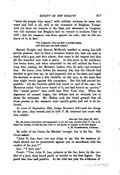
[p. 517]
"when the proper time came," with sublime coolness he came into court and told it all, still at the command of Brigham Young! And yet there are lawyers in the East, and statesmen in Congress, who will maintain that Brigham had no control in southern Utah in 1857; that the massacre was done against his wish; that he did not know of it, in fact!
"Oh, judgment! thou art tied to brutish beasts, And men have lost their reason."
Samuel Knight and Samuel McMurdy testified to seeing Lee kill several persons; that he blew a woman's brains out, beat one man to death with a gun, and shot others; then came to the wagons and shot all the wounded men with a pistol. At this point in the testimony Lee broke down, and when remanded to his cell walked the floor a long time, cursing the Mormon leaders who, he said, had betrayed him. He knew, even before his attorney did, that the Church had decided to give him up; he had suspected this at the start, and urged his attorney to secure a few Gentiles on the jury, in the hope that they might revolt against this conspiracy. But this had proved impossible. All the Gentiles called had heard or read of the case; the Mormons called "had never heard of it, and had formed no opinion." For "model jurors" they could beat New York City. When the argument of counsel began, the defense had no recourse but to abuse the witnesses. Mr. Bishop took the broad ground that all those present at the massacre were equally guilty and not to be believed.
At noon of September 20th, Judge Boreman delivered his charge to the jury; they retired, and at 3:30 P. M. returned into court with this verdict:
Beaver City, Sept. 20, 1876.
We, the jurors, duly sworn and impaneled to try the case wherein John D. Lee is indicted for murder, do find the said John D. Lee guilty of murder in the first degree.
A. M. Farnsworth, Foreman.
By order of the Court, the Marshal brought Lee to the bar. The Court asked:
"John D. Lee, have you any thing to say why the sentence of death should not be pronounced against you in accordance with the verdict of the jury?"
Lee: "I have not."
Court: "You, John D. Lee, prisoner at the bar, have, by the verdict of a jury, been found guilty of murder in the first degree. The proof was clear and positive. At the trial last year the evidences of
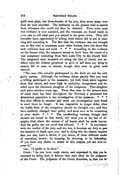
[p. 518]
guilt were plain, but three-fourths of the jury, from some cause, were then for your acquittal. The testimony on the present trial is mainly from witnesses who could not then be obtained. From some cause this evidence is now unsealed, and the witnesses are found ready in your case to tell what part you played in the great crime. They will hereafter have opportunity of telling what others did to aid in planning and executing it. The fact that the evidence was not brought out on this trial to criminate some other leaders, does not show that such evidence does not exist. * * * According to the evidence on the former trial, the massacre seems to have been the result of a vast conspiracy extending from Salt Lake City to the bloody field. The emigrants were hounded all along the line of travel, and nowhere were the citizens permitted to give or sell them any thing to sustain life in man or animal, though they were in great need thereof.
"The men who actually participated in the deed are not the only guilty parties. Although the evidence shows plainly that you were a willing participant in the massacre; yet both trials taken together show that others, and some high in authority, inaugurated and decided upon the wholesale slaughter of the emigrants. That slaughter took place nineteen years ago. From that time to the present term of court there has been throughout the Territory a persistent and determined opposition to any investigation of the massacre. * * * But their efforts to smother and crush out investigation were found to avail them no longer. It was impossible to longer delay when the inside facts of the conspiracy should be brought out; and they have suddenly changed their policy, and seem now to be consenting to your death. * * * The unofending victims, though their mouths are closed in this world, will meet you at the bar of Almighty God, where the secrets of all hearts shall be made known. And the guilty can not avoid that tribunal. * * * In accordance with the verdict of the jury, and the law, it becomes my duty to pass the sentence of death upon you; and in doing this the statute requires that you may have a choice, if you desire, of three different modes of execution, to-wit: by hanging, by shooting, or by beheading. If you have any choice or desire in this respect, you can now express it."
Lee: "I prefer to be shot."
Court: "As you have made choice, and expressed it, that you be executed by being shot, it follows that such shall be the judgment of the Court. The judgment of the Court, therefore, is, that you be
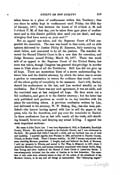
[p. 519]
taken hence to a place of confinement within this Territory; that you there be safely kept in confinement until Friday, the 26th day of January, 1877; that between the hours of 10 o'clock A. M. and 3 o'clock P. M. of that day, you be taken from ypur place of confinement and in this district publicly shot until you are dead; and may Almighty God have mercy on your soul!"
But an appeal was taken, and the Supreme Court of Utah suspended the execution. The case was heard in that court, and an able opinion delivered by Justice Philip H. Emerson, fully sustaining the court below, and concurred in by all the justices. The mandate directed the Second District Court to fix a new date for execution, and Judge Boreman named Friday, March 23, 1877. There was much talk of an appeal to the Supreme Court of the United States, but none was taken, though Congress has granted this privileg in murder cases to Utah alone of all the Territories. Still Lee did not give up all hope. There are mysterious hints of a secret understanding between him and the district attorney, by which the latter was to secure a pardon or commutation in return for evidence that would convict all the others guilty of complicity in the massacre. Lee's wife, Rachel, shared his confinement to the last, and Lee worked steadily on his confession. But if there was any such agreement, it was set aside, and the convicted man at last resigned all hope. He then wrote out a full confession, and gave it to the district attorney; but the latter has only published such portions as would in no way interfere with his plans for convicting others. A previous confession written by Lee, and delivered to his attorney, W. W. Bishop, Esq., has also been published—the lawyer having agreed with Lee to sell the paper to the press, take his fee therefrom, and pay over the remainder to Rachel. In these confessions Lee at last tells nearly all the truth, still shielding himself, however, and denying any actual killing. I append the most important sections:
My name is John Doyle Lee. I was born September 6, 1812, at Kaskaskia, Randolph County, Illinois. My mother belonged to the Catholic Church, and I was christened in the faith. My parents died while I was still a child, and my boyhood was one of trial and hardship. I married Agatha Ann Woolsey in 1833, and moved to Fayette County, Illinois, on Sucker Creek. There I became wealthy. In 1836 I became acquainted with some traveling Mormon preachers. I bought, read, and believed the Book of Mormon. I sold my property in Illinois, and moved to Far West, in Missouri, in 1837, where I joined the Mormon Church, and became intimately acquainted with Joseph Smith, Brigham Young, and other leaders of the Church of Jesus Christ of Latter-day Saints. I was subsequently initiated into the order of Danites at its first formation. The members of this order were solemnly sworn to obey all the orders of the priesthood of the Mormon church, to do any and all things as commanded. The "destroying angels"
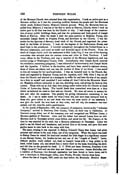
[p. 520]
of the Mormon Church were selected from this organization. I took an active part as a Mormon soldier, as it was the recurring conflicts between the people and the Mormons which made Jackson County, Missouri, historic ground. When the Mormons were expelled from Missouri, I was one of the first to settle at Nauvoo, Illinois, where I took an active part in all that was done by the Church or city. I had charge of the construction of many public buildings there, and was the policeman and body-guard of Joseph Smith at Nauvoo. After his death I held the same position to Brigham Young, who succeeded Joseph Smith as Prophet, Priest, and Revelator in the Church. I was Recorder for the Quorum of Seventy, head clerk of the Church, and organized the priesthood in the Order of Seventy. I took all the degrees of the Endowment House, and stood high in the priesthood. I traveled extensively throughout the United State as a Mormon missionary, and acted as trader and financial agent of the Church. From the death of Joseph Smith until the settlement at Salt Lake City, I was one of the locating committee that selected sites for various towns and cities in Utah Territory. I held many offices in the Territory, and was a member of the Mormon legislature, and was probate judge of Washington County, Utah. Immediately after Joseph Smith received the revelation concerning polygamy, I was informed of its doctrines by said Joseph Smith and the Apostles. I believe in the doctrine, and have been sealed to eighteen women, three of whom are sisters, and one was the mother of three of my wives. I was sealed to this old woman for her soul's salvation. I was an honored man in the Church, flattered and regarded by Brigham Young and the Apostles, until 1868, when I was cut off from the Church and selected as a scapegoat to suffer for and bear the sins of my people. As a duty to myself and mankind I now confess all that I did at the Mountain Meadow Massacre, without animosity to any one, shielding none, and giving the facts as they existed. Those with me at that time were acting under orders from the Church of Jesus Christ of Latter-day Saints. The horrid deeds then committed were done as a duty which we believed we owed to God and our Church. We were all sworn to secrecy before and after the massacre. The penalty for giving information concerning it was death. As I am to suffer death for what I then did, and have been betrayed both by those who gave orders to act and those who were the most active of my asistants, I now give the world the true facts as they exist, and tell why the manners was committed, and who were the active participants.
In the month of September, 1857, the company of emigrants, known as the "Arkansas Company," arrived in Parowan, Iron County, Utah, on their way to California. At Parowan young Aden, one of the company, saw and recognized one William Laney, a Mormon resident of Parowan. Aden and his father had rescued Laney from an anti-Mormon mob in Tennessee several years before, and saved his life. He (Laney ), at the time he was attacked by the mob, was a Mormon missionary in Tennessee. Laney was glad to see his friend and benefactor, and invited him to his house, and gave him some garden sauce to take back to the camp with him.
The same evening it was reported to Bishop (Colonel) Dame that Laney had given potatoes and onions to the man Aden, one of the emigrants. When the report was made to Bishop Dame he raised his hand and crooked his little finger in a significant manner to one Barney Carter, his brother-in-law, and one of the "Angels of Death." Carter, without another word, walked out, went to Laney's house with a long picket in his hand, called Laney out, and struck him a heavy blow on the head, fracturing his skull, and left him on the ground for dead. C. Y. Webb and Isaac Newman, President of the "High Council," both told me that they saw Dame's maneuvers. James McGuffee, than a resident of Parowan—but through oppression has been forced to leave there, and is now a merchant in Pahranagat valley, near Pioche, Nevada—knows these facts.
About the last of August, 1857, some ten days before the Mountain Meadow Massa-
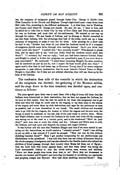
[p. 521]
cre, the company of emigrants passed through Cedar City. George A. Smith—then first Councilor in the Church and Brigham Young's right-hand man—came down from Salt Lake City, preaching to the different settlements. I, at that time, was in Washington County, near where St. George now stands. He sent for me. I went to him, and he asked me to take him to Cedar City by way of Fort Clara and Pinto settlements, as he was on business, and must visit all the settlements. We started on our way up through the canñon. We saw bands of Indians, and he (George A. Smith) remarked to me that these Indians, with the advantage they had of the rocks, could use up a large company of emigrants, or make it very hot for them. After pausing for a short time he said to me, "Brother Lee, what do you think the brethren would do if a company of emigrants should come down through here making threats? Don't you think they would pitch into them?" I replied that "they certainly would." This seemed to please him, and he again said to mc, " And you really think the brethren would pitch into them?" "I certainly do," was my reply; " and you had better instruct Colonel Dame and Haight to attend to it that the emigrants are permitted to pass, if you want them to pass unmolested." He continued: "I asked Isaac (meaning Haight) the same question, and he answered me just as you do, and I expect the boys would pitch into them." I again said to him that he had better say to Governor Young, that if he wants emigrant companies to pass without molestation, that he must instruct Colonel Dame or Major Haight to that effect; for if they are not ordered otherwise, they will use them up by the help of the Indians.
The confession then tells of the councils in which the destruction of the emigrants was decreed; the gathering of the Mormon militia, and the siege down to the time treachery was decided upon, and continues as follows:
The plan agreed upon there was to meet them with a flag of truce, tell them that the Indians were determined on their destruction; that we dare not oppose the Indians, for we were at their mercy; that the best we could do for them (the emigrants) was to get them and what few traps we could take in the wagons, to lay their arms in the bottom of the wagon, and cover them up with bed-clothes, and start for the settlement as soon as possible, and to trust themselves in our hands. The small children and wounded were to go with the two wagons, the women to follow the wagons and the men next, the troops to stand in readiness on the east side of the road ready to receive them. Shirts and Nephi Johnson were to conceal the Indians in the brush and rocks till the company was strung out on the road to a certain point, and at the watchword "Halt! do your duty!" each man was to cover his victim and fire. Johnson and Shirts were to rally the Indians, and rush upon and dispatch the women and larger children.
It was further told the men that President Haight said that if we were united in carrying out the instructions, we would receive a "celestial reward." I said I was willing to put up with a less reward, if I could be excused. "How can you do this without shedding innocent blood?" Here I got another lampooning for my stubbornness and disobedience to the priesthood. I was told that there was not a drop of innocent blood to the whole company of emigrants, and was also referred to the Gentile nation who refused the children of Israel passage through their country when Moses led them out of Egypt— that the Lord held that crime against them; and that when Israel was strong the Lord commanded Joshua to slay the whole nation, men, women, and children. "Have not these people done worse than that to nus? Have they not threatened to murder our leaders and Prophet? and have they not boasted of murdering our patriarchs and prophets, Joseph and Hyrum? Now talk about shedding innocent blood!" They
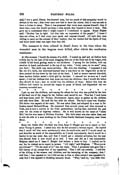
[p. 522]
said I was a good, liberal, free-hearted man, but too much of this sympathy would be always in the way; that every man now had to show his colon; that it was not safe to have a Judas in camp. Then it was proposed that every man expres himself; that if there was a man who would not keep a close mouth, they wanted to know it then. This gave me to understand what I might expect if I continued to oppose. Major Higbee said: "Brother Lee is right. Let him take an expression of the people." I knew I dare not refuse, so I had every man speak and express himself. All said they were willing to carry out the counsel of their leaders; that the leaders had the Spirit of God, and knew better what was right than they did.
The massacre is then related in detail down to the time when the wounded men in the wagons were killed, after which the confesion continues:
At this moment I heard the scream of a child. I looked up and saw an Indian have a little boy by the hair of his head, dragging him out of the hind end of the wagon, with a knife in his hand, getting ready to cut his throat. I sprang for the Indian, with my revolver in hand, and shouted to the top of my voice: "Arick, ooma, cot too sooet," (stop, you fool.) The child was terror-stricken. His chin was bleeding. I supposed it was the cut of a knife, but afterward learned that it was done on the wagon-box as the Indian yanked the boy down by the hair of the head. I had no sooner rescued this child, than another Indian seized a little girl by the hair. I rescued her as soon as I could speak; I told the Indians that they must not hurt the children—that I would die before they should be hurt; that we would buy the children of them. Before this time the Indians had rushed up around the wagon in quest of blood, and dispatched the two runaway wounded men.
* * * * * * * * * * *
I got up, saw the children, and among the others the boy who was pulled by the hair of his head out of the wagon by the Indian—and saved by me. That boy I took home and kept home until Dr. Forney, Government Agent, came to gather up the children and take them East. He took the boy with the others. The boy's name was Fancher. His father was captain of the train. He was taken East, and adopted by a man in Nebraska, named Richard Sloan. He remained East several years, and then returned to Utah, and is now a convict in the Utah penitentiary, having been convicted the past year for the crime of highway robbery. He is well known by the name of "Idaho Bill," but his true name is William Fancher. His little sister was also taken East, and is now the wife of a man working for the Union Pacific Railroad Company, near Green River.
* * * * * * * * * * *
Some two weeks after the deed was done, Isaac C. Haight sent me to report to Governor Young in person. I asked him why he did not send a written report. He replied that I could tell him more satisfactorily than he could write, and if I would stand up and shoulder as much of the responsibility as I could conveniently, that it would be a feather in my cap some day, and that I would get a celestial salvation, but the man that shrunk from it now would go to hell. I went and did as I was commanded. Brigham asked me if Isaac C. Haight had written a letter to him. I replied, not by me; but he wished me to report in person. "All right," said Brigham. "Were you an eye-witness?" To the most of it," was my reply. Then I proceeded and gave him a full history of all, except that of my opposition. That I left out entirely. I told him of the killing of the women and children, and the betraying of the company; that, I told him, I was opposed to; but I did not say to him to what extent I was opposed to it, only that I was opposed to shedding innocent blood. "Why," said he, "you difer from
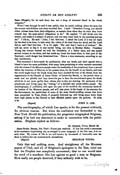
[p. 523]
Isaac (Haight), for he said there was not a drop of innocent blood in the whole company."
When I was through he said it was awful; that he cared nothing about the men, but the women and children was what troubled him. I said: "President Young, you should either release them from their obligation, or sustain them when they do what they have entered into the most sacred obligations to do." He replied: "I will think over the matter, and make it a subject of prayer, and you may come back in the morning and see me." I did so. He said: "John, I feel first-rate. I asked the Lord, if it was all right for the deed to be done, to take away the vision of the deed from my mind, and the Lord did so, and I feel first-rate. It is all right. The only fear I have is of traitors." He told me never to lisp it to any mortal being, not even to Brother Heber. President Young has always treated me with the friendship of a father since, and has sealed several women to me since, and has made my home his home when in that part of the Territory—until danger has threatened him. This is a true statement, according to my best recollection.
This statement I have made for publication after my death, and have agreed with a friend to have the same published, with many facts pertaining to other matters connected with the crimes of the Mormon people under the leadership of the priesthood, from a period before the butchery of Nauvoo, to the present time, for the benefit of my family, and that the world might know the black deeds that have marked the way of the Saints from the organization of the Church of Jesus Christ of Latter-day Saints, to the period when a weak and too pliable tool lays down his pen to face the executioner's guns for deeds which he is not more guilty than others, who to-day are wearing the garments of the priesthood, and living upon the "tithing" of a deluded and priest-ridden people. My autobiography, if published, will open the eyes of the world to the monstrous deeds of the leaders of the Mormon people, and will also place in the hands of the attorney for the Government, the particulars of some of the most blood-curdling crimes that have been committed in Utah, which, if properly followed up, will bring many down from their high places in the Church to face offended justice upon the gallows. So mote it be.
(Signed) JOHN D. LEE.
The autobiography, of which Lee speaks, is for the present withheld, for obvious reasons. But when the confession was forwarded to the New York Herald for publication, the proprietor telegraphed Brigham, asking if he had any statement to make in connection with the publication. Brigham replied as follows:
St. George, Utah, March 22.
James Gordon Bennett, New York:—Yours just received. If Lee has made a statement in his confession implicating me, as charged in your telegraph of the 21st inst., it is utterly false. My course of life is too well known by thousands of honorable men for them to believe for one moment such accusations.
(Signed) BRIGHAM YOUNG.
Only that and nothing more. And straightway all the Mormon papers of Utah, and all of Brigham's apologists in the East, cried out that the Prophet was completely exonerated; that no one would take the word of a murderer like Lee against so good a man as Brigham. How easily are people deceived, if they ardently wish to be.
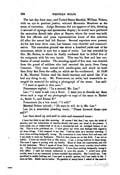
[p. 524]
The last day drew near, and United States Marshal, William Nelson,with an eye to poetical justice, selected Mountain Meadows as the scene of execution. Judge Boreman did not approve of this, thinking it savored of revenge and spectacular display; he would have preferred the execution should take place at Beaver, where the court was held. But few otlicials and press representatives knew of this selection till after the escort had left Beaver. Several reporters were present. As his last hour drew near, Lee became very cheerful and communicative. The execution ground was about a hundred yards east of the monument, which is now but a mass of rocks. Lee was attended by Rev. Mr. Stokes, to whom he finally confessed that he killed five of the emigrants with his own hands. This was his first and last confession of actual murder. The shooting squad of live men was detailed from the guard of soldiers who had escorted the party from Camp Cameron. They were armed with needle-guns, and stood no more than forty feet from the coilin, on which sat the condemned. At 10:30 A. M., Marshal Nelson read the death-warrant, and asked Lee if he had any thing to say. Mr. Fennemore, an artist, had meanwhile arranged his material for taking a photograph of the scene. Lee said:
"I want to speak to that mun."
Fennemore replied: "In a second, Mr. Lee."
Lee: "I want to ask you a favor. I want you to furnish my three wives each a copy of my photograph—a copy of the same to Rachel A., Sarah C., and Emma B."
Fennemore (in a low tone): "I will."
Marshal Nelson (aloud): "He says he will do it, Mr. Lee."
Lee (in a somewhat pleading tone): "Please forward them—youwill?"
Lee then stood up and said in calm and measured tones:
I have but little to say this morning. Of course I feel that I am upon the brink of eternity, and the solemnities of eternity should rest upon my mind st the present I have made out, or endeavored to do so, a manuscript and an abridged history of my life. This is to be published, sir. I have given my views and feelings with regard to all these things. I feel resigned to my fate. I feel as calm as a summer morning. I have done nothing deaignedly wrong. My conscience is clear before God and man, and I am ready to meet my Redeemer. This it is that places me on this field. I am not an infidel. I have not denied God or His mercy. I am a strong believer in these things The most I regret is parting with my family. Many of them are unprotected, and will be left fatherless. When I speak of those little ones, they touch stender chord within me. (Here Lee's voice faltered perceptibly.) I have done nothing designedly wrong in this affair. I used my utmost endeavors to save this people. I would have given worlds, were it at my command, to have avoided that calamity. But I could not. I am sacrificed to satisfy feelings, and I am used to gratify parties, but I am ready to die. I have no fear. Death has no terror. No particle of mercy have I asked of the court or
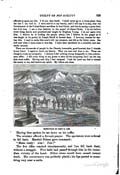
[p. 525]
officials to spare my life. I do not fear death. I shall never go to a worse place than the one I am now in. I have said it to my family, and I will say it to-day, that the Government of the United States sacrifices its best friend, and that is saying a great deal, but it is true. I am a true believer in the gospel of Jesus Christ. I do not believe every thing that is now practiced and taught by Brigham Young. I do not agree with him. I believe he is leading the—people astray; but I believe in the gospel as it was taught in its purity by Joseph Smith in former days. I have my reasons for saying this. I used to make this man's will my pleasure, and did so for thirty years. See how and what I have come to this day. I have been sacrificed in a cowardly and dastardly manner.
There are thousands of people in the Church, honorable, good-hearted, that I cherish in my heart. I regret to leave my family. They are near and dear to me. These are things to rouse my sympathy. I declare I did nothing wrong designedly in this unfortunate affair. I did every thing in my power to save all the emigrants, butI am the one that must suffer. Having said this, I feel resigned. I ask the Lord my God to extend his mercy to me, and receive my spirit. My labors are done.
EXECUTION OF JOHN D. LEE
Having thus spoken he sat down on his coffin.
The minister offered a fervent prayer. The spectators were ordered to fall back. Marshal Nelson gave command:
"Make ready! Aim! Fire!"
The five rifles cracked simultaneously, and Lee fell back dead, without a struggle. Five balls had passed through him in the immediate vicinity of the heart. Either alone would have caused instant death. His countenance was perfectly placid; his lips parted to something very near a smile.
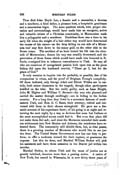
[p. 526]
Thus died John Doyle Lee, a fanatic and a sensualist, a devotee and a murderer, a kind father, a pleasant host, a hospitable gentleman and a remorseless bigot. The same qualities which, with proper education and surroundings, would have made him an energetic, active and valuable citizen of a Christian community, in Mormonism made him a polygamist and a murderer. Doubtless there was a time in his early life when the weight of a hair either way would have determined the course of his career—as the drop falling on one side of a Minnesota roof may flow down to the sunny gulf, on the other side to the frozen ocean. The accident of an hour turned his life into the channels of Mormonism; thence his way was steadily downward, and the perversion of those forces which would have made him honored in Illinois, consigned him to infamous remembrance in Utah. So may all who are conscious of unregulated passion look upon him as the pious bishop did upon the hardened convict, "There go I, but for the grace of God."
It only remains to inquire into the probable, or possible, fate of his companions in crime, and the proof of Brigham Young's complicity. Of those indicted, only George Adair and Elliott Wilden are in custody, both minor characters in the tragedy, though other participants testified on the trial. But the really guilty, such as Isaac Haight, John M. Higbee and William C. Stewart—the men who planned and carried the matter through exultingly—are in hiding in the Indian country. For a long time they lived in a mountain fastness of south-eastern Utah, and Hon. G. C. Bates, their attorney, visited and conversed with them in their chosen stronghold. He gave me a dramatic account of his experience there; of his going in at night and returning the next night, by a way so devious that none but Indians or I the most accomplished scouts could find it. But even that place did not make them feel safe; and since the Mormons extended their southern settlements into New Mexico and Arizona, the murderers have retreated there. The community still shields them, but, as time passes, there is a growing number of Mormons who would like to see justice done. The United States Government now has one duty to perform: to offer a moderate reward for their capture, or guarantee the expense. Let this be done, and Marshal William Stokes will pick his assistants and have those assassins in the Beaver jail within two months.
Marshal Stokes, to whom Utah and the cause of justice are so greatly indebted, deserves more than a passing notice. A native of New York, but reared in Wisconsin, he is now thirty-three years of
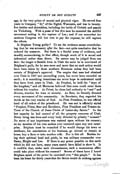
[p. 527]
age, in the very prime of mental and physical vigor. He served four years in Company "D," of the Eighth Wisconsin, and was in twenty-five battles and skirmishes, including the battle of Corinth and assault on Vicksburg. With a posse of but live men he executed the skillful movement ending in the capture of Lee; and if our somewhat too cautions Congress will but vote to pay the expense, he will capture the others.
Is Brigham Young guilty? To me the evidence seems overwhelming that he was accessory after the fact—not quite conclusive that he ordered the massacre. But there is a fearful array of evidence, and steadily accumulating, to that effect, though much of it is moral and inferential rather than direct. Its nature may be judged from one fact: the longer a Gentile lives in Utah the more he is convinced of Brigham's guilt, for he sees more and more that no such action would have been taken by those southern Mormons unless they had been certain of Brigham's approval. The empire that man had obtained over Utah in 1857 and succeeding years, has never been exceeded on earth; it is something Americans can never hope to understand until they have lived years in Utah. As Prophet, he held the "keys of the kingdom," and all Mormons believed that none could enter there without his voucher. As Priest, he alone had authority to "seal" and divorce, whether for time or eternity. As Seer, he literally directed every movement of the community. As Revelator, they regarded his words as the very oracles of God. As First President, he was official head of all orders of the priesthood. He was and is officially styled "Prophet, Priest, Seer and Revelator, First President and Trustee-in-Trust of the Church of Jesus Christ of Latter-day Saints." In the last capacity he had control of all the property concerns of Utah. Every thing was done and every body directed by priestly "counsel." No move of any importance was entered upon without his consent; no lay member of his own motion ever ventured upon any new enterprise. Brigham must be consulted if he would change his town or residence, his associations or his business, go abroad or remain at home, buy a farm or take another wife. Nor is this all. Besides being their spiritual head and guide, he was military commander over Dame, Haight and Lee. If there is any power possible on this earth which he did not have, many years search have failed to show it. Is it credible that, under such circumstances, such a momentous affair could take place without his consent? Scores of times have I heard Brigham speak of the power he exercised over "this people." It has been his boast for thirty years that the Saints would do nothing against
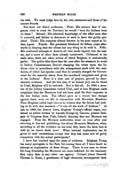
[p. 528]
his wish. We must judge him by his own utterances and those of his nearest friends.
But there are direct evidences. First: His sermon that if emigrants tried to cross the Territory he would "turn the Indians loose on them." Second: His admitted knowledge of the affair soon after it occurred, and failure to denounce or seek to have the guilty punished. Third: His complete silence thereon in his next report as Indian Agent. Fourth: His persistent falsehood for fifteen years alterwards in denying that the whites had any thing to do with it. Fifth: His continued attempts to deceive all who made inquiry into the matter, and a score of other facts already mentioned. Collateral to the main issue, there are other crimes of which Brigham is undoubtedly guilty. The public files show that the year after the massacre he wrote to Indian Commissioner Denver charging the crime upon the Indians—this in accordance with the arrangement made with the murderers, of which Lee speaks—and that he actually charged the Government for the material taken from the murdered emigrants and given to the Indians! Here is a clear case of perjury, proved by documentary evidence. And for this also, if an honest jury can be found in Utah, Brigham will be indicted. Nor is this all. In 1864 a member of the Indian Committee visited Utah, and to him Brigham made complaint that the Mormons had not been paid for their expenses in the late Indian wars. The official gave as a reason that charges against them were on file in connection with Mountain Meadows. Then Brigham called high heaven to witness that the Saints had nothing to do with that massacre—" it was all the work of Indians." As late as 1869, the Deseret News, Brigham Young's potlicial organ, contained an article written by Apostle George Q. Cannon, present Delegate in Congress from Utah, bitterly denying that any Mormon was engaged. Thus the Mormon authorities went on year after year swearing to lies and publishing lies about Mountain Meadows, when, according to all the evidence on the trial, they knew the facts then as well as we know them now! What rational explanation can be given of such crookedness, except that they had some sort of guilty connection with the actual participants?
I have but touched upon the mass of evidence. Brigham Young has many apologists in the East, but among them all I have heard no attempt at explanation of these things. There is one man to whose life-long friendship the Mormons are more indebted for the immunity they enjoy than to any other one agency. Colonel (since General) Thomas L. Kane, a gentleman of high character, accompanied them
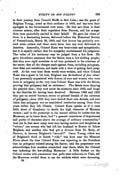
[p. 529]
in their journey from Council Bluff's to Salt Lake; was the guest of Brigham Young; acted as their mediator in 1858, and has been their apologist to the Government ever since. He first saw them in their extreme misery, after their expulsion from Nauvoo, and his sympathies were powerfully excited in their behalf. He gave his views of them in a fascinating lecture, delivered before the Historical Society of Pennsylvania, March 26, 1850, and that lecture has probably covered more crimes and done more harm than any ever delivered in America. Assuredly, Colonel Kane was benevolent and sympathetic; but it is equally certain that his sympathy overbalanced his judgment. The value of his testimony may be judged from a few facts. He gave his solemn assurance that the Saints were a law-abiding people; that they were rigid moralists in all that pertained to the relations of the sexes; that all the charges made against them, including polygamy, were false and scandalous, and made with a view of getting their property. At the very time these words were written, and when Colonel Kane was a guest in his tent, Brigham was the husband of four wives! I am personally acquainted with dozensiof men and women who were born in polygamy at the very time Colonel Kane was with the Saints, proving that polygamy had no existence! The Saints were denying the practice then; they now avow its existence since 1843, and laugh at the Gentiles for having been deceived. Between 1843 and 1852 they put on record fourteen sworn or printed denials of the existence of polygamy; since 1852 they have denied their own denials, and now claim that polygamy was an established institution among them three years before they left Illinois. Colonel Kane speaks as if it were little short of blasphemy to doubt the high character of Mormon women; and in the postscript to the second edition he insists that the Mormons, as he knew them, had "a general correctness of deportment and purity of character above the average of ordinary communities." And yet in that same camp were men having mother and daughters as "wives;" one woman who had left her husband in Boston to follow Brigham, and another who had got a divorce from Dr. Seely, of Nauvoo, to become Brigham's "second!" Oscar Young, oldest son of Brigham's third or fourth "wife," was born near the Missouri River about the time Colonel Kane was reporting to the President that no polygamy existed among the Saints; and the perpetrator now acknowledges four murders committed near there, while the Colonel was indorsing the law-abiding Mormons! A little further on the Colonel recites with amazement that gulls were unknown in Utah, till the Mormons needed them to eat the crickets which were devouring
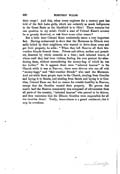
[p. 530]
their crops! And this, when every explorer for a century past has told of the Salt Lake gulls, which are certainly as much indigenous to the Great Basin as the blackbird is to Ohio! There remains but one question in my mind: Could a man of Colonel Kane's acumen be so grossly deceived, or was there some other reason?
But a little later Colonel Kane accidentally states a very important fact. Having endeavored to show that the Mormons in Illinois were sadly belied by their neighbors, who wanted to drive them away and get their property, he adds: "When they left Nauvoo all their fair-weather friends forsook them. Priests and elders, scribes and preachers, deserted by whole councils at a time; each talented knave, of whose craft they had been victims, finding his own pretext for abandoning them, without surrendering the money-bag of which he was the holder." So it appears there were "talented knaves" in the Church while it was at Nauvoo; there were thieves who ran off with "money-bags," and "fair-weather friends" who used the Mormons. And yet while these people were in the Church, stealing from Gentiles and laying it to Saintshand stealing from Saints and laying it to Gentiles, Colonel Kane can find no reason for outside hostility to Nauvoo, except that the Gentiles wanted their property. He proves that nearly half the Nauvoo community was composed of adventurers from all parts of the country, "talented knaves" who proved to be thieves, and then maintains that the Illinois Gentiles were responsible for all the troubles there! Verily, benevolence is a grand sentiment; but it may be overdone.